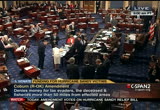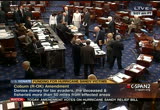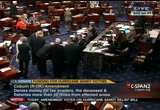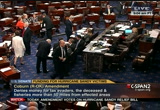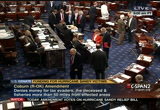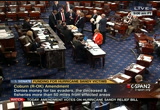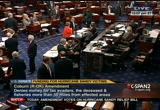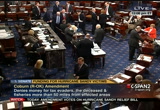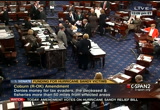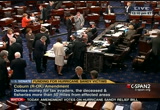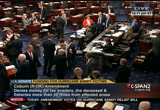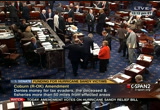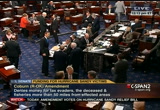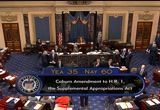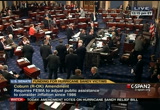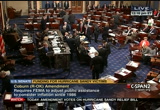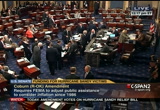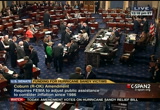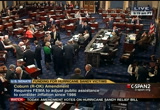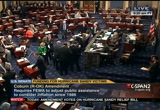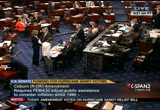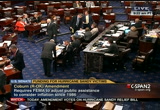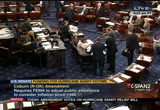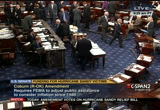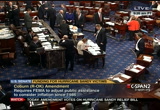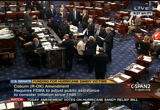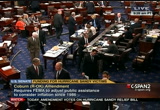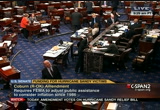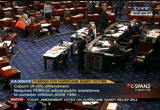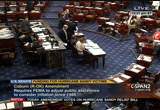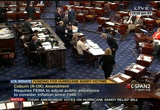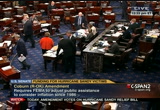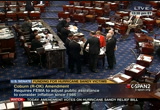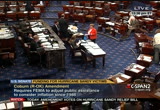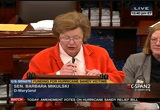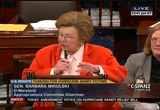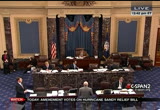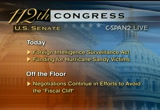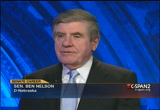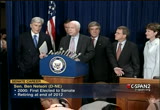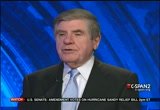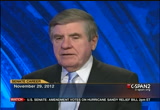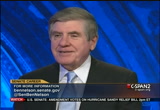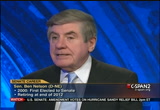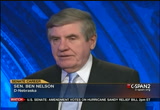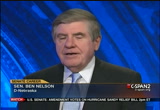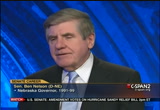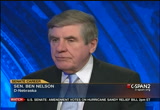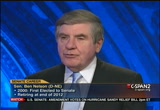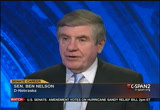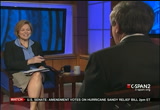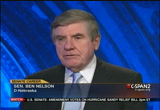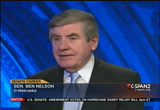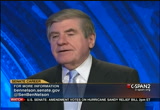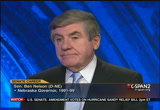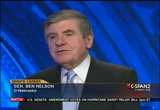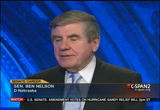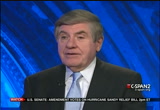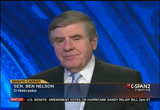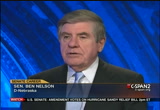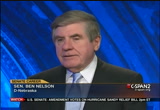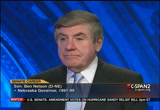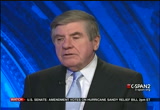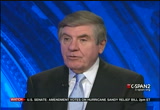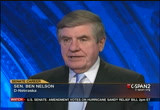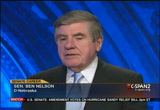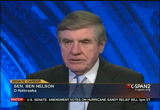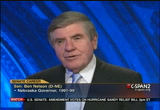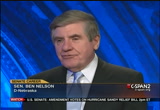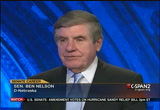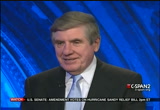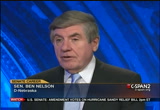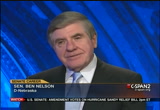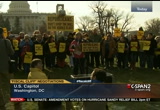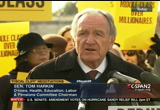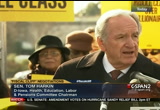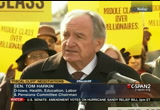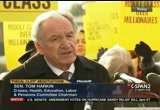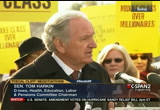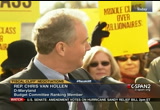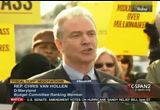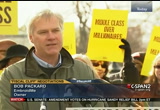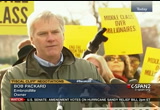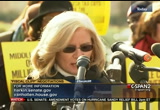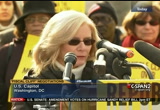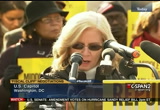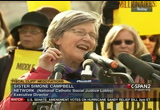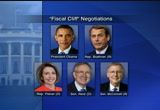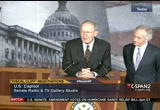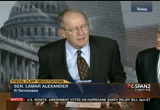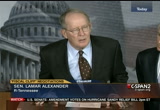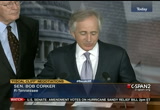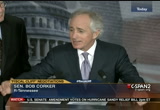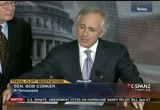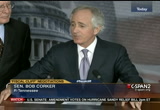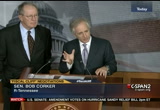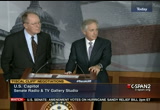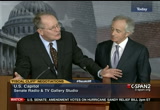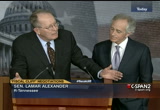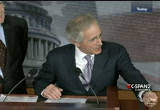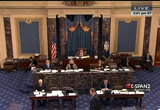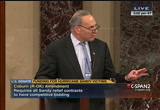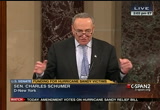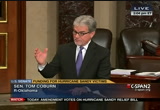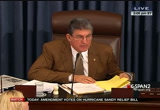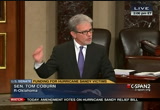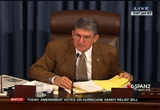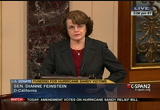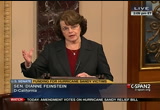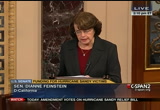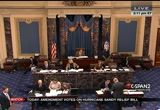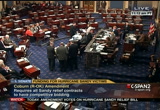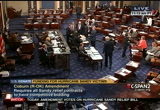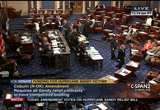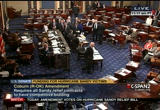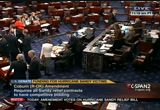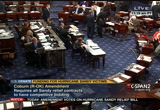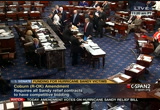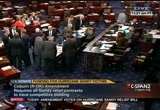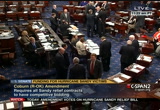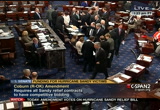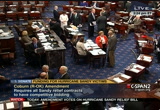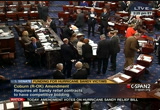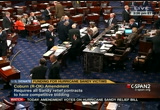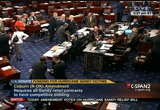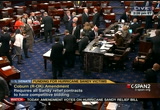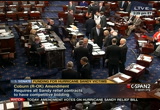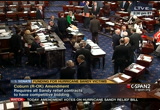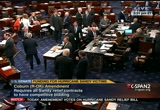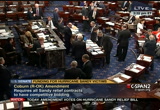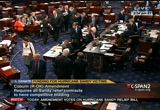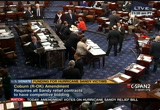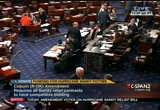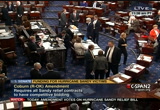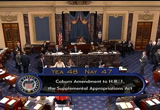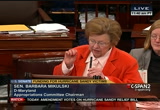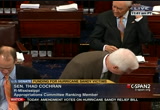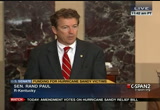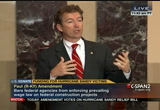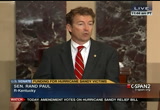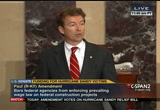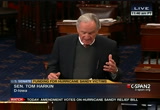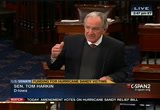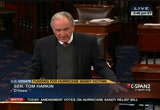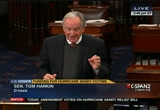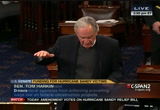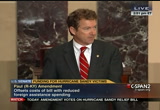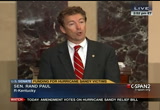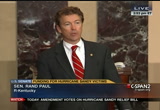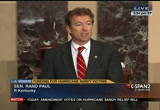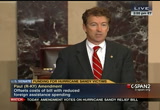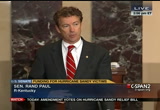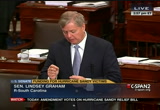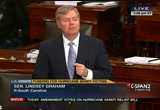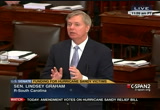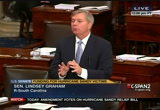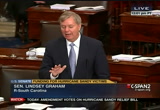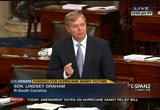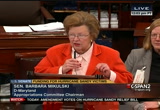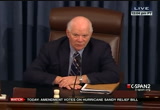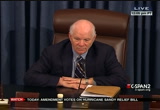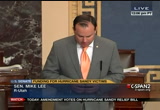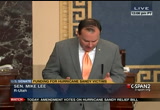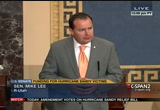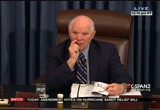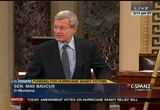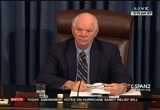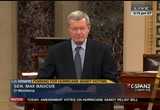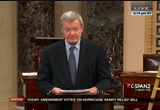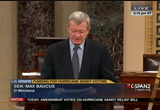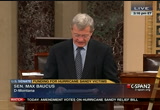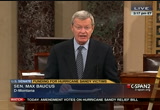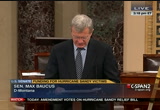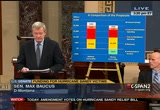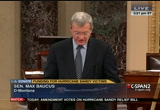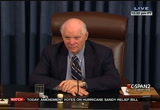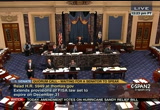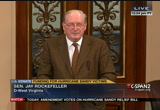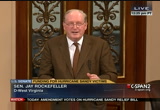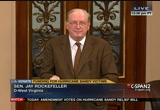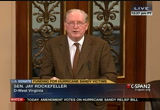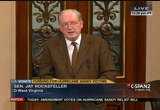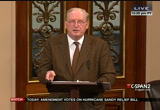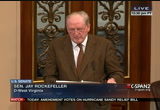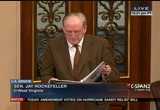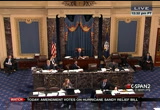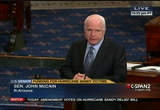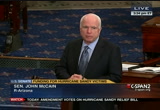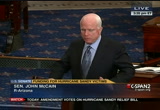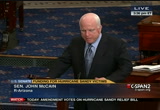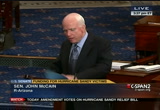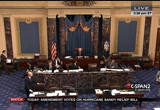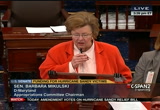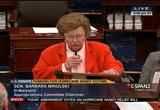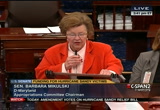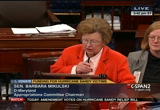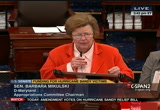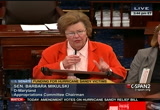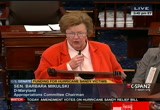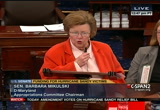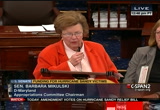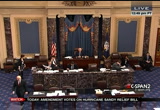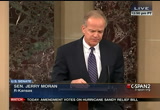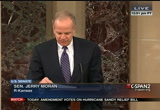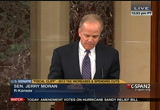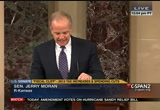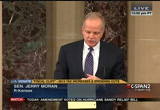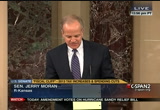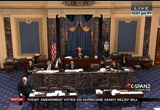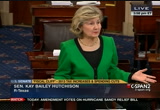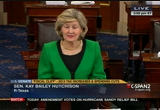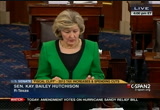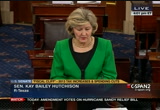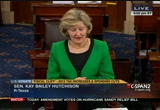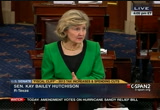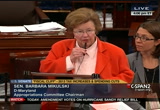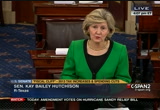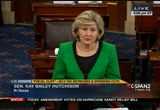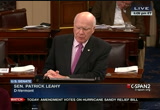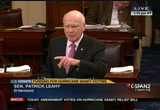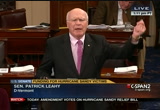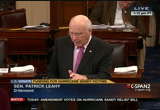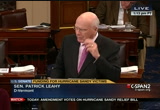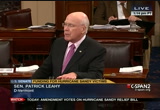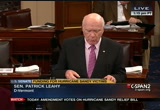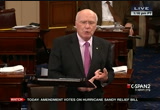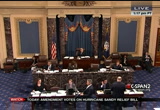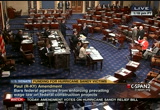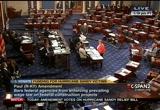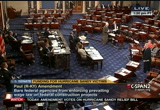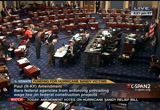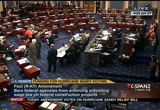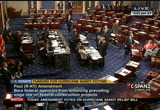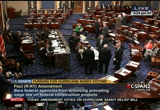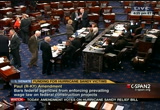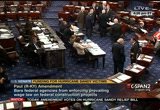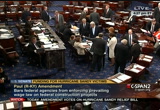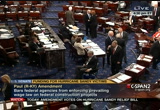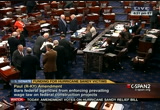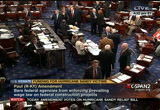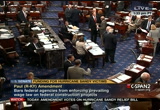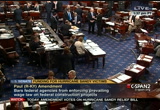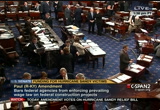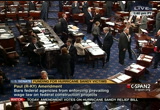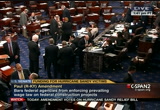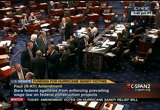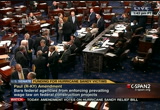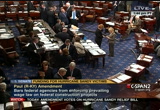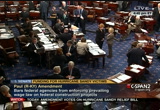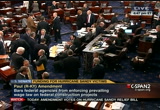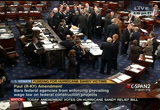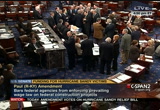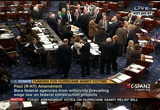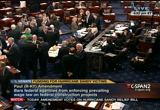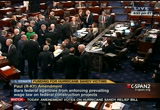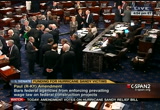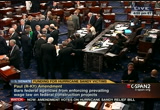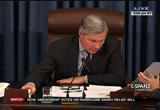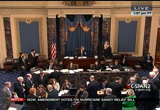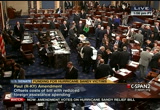tv U.S. Senate CSPAN December 28, 2012 12:00pm-5:00pm EST
12:14 pm
the presiding officer: are there any members in the chamber wishing to vote or change their vote? if not, on this vote, the yeas are 35, the nays are 60. under the previous order requiring 60 votes for the adoption of the amendment, the amendment is not agreed to. the presiding officer: under the previous question, the amendment is number 37371.
12:15 pm
12:39 pm
any senators wishing to vote or change their vote? if not, on this vote, the yeas are 40, the nays are 35. under the previous order -- 55. under the previous order requiring 60 votes for the adoption of this amendment, the amendment is not agreed to. ms. mikulski: mr. president? the presiding officer: the senator from maryland. ms. mikulski: mr. president? the presiding officer: the senate will be in order. please take your business outside. ms. mikulski: mr. president, i ask unanimous consent that when the senate reconvenes at 2:00 p.m., we debate the next two coburn amendments in order and upon the use or yielding back of time on those amendments, the senate proceed to vote in relation to the coburn amendments, with all provisions of the previous order remaining in effect. the presiding officer: no objection? without objection. ms. mikulski: mr. president, simply what this means is this, and i'm really asking for the
12:40 pm
senators to pay attention on this. so -- because they're very keenly interested in the schedule, and i really want to thank the distinguished senator from mississippi, senator cochran, for working on the expeditious disposition of our amendments. senators should be aware that after 2:00 p.m., they should be in the chamber to vote on these amendments. these are ten-minute votes and we do not intend to hold the votes beyond the time. the leadership on both sides of the aisle will be going to the white house to discuss the really critical, crucial matters before the nation. they must go to the white house but they will want to exercise their vote. so let's cooperate with the leadership. at 2:00, senator coburn will make his debate, we'll have an orderly, crisp rebuttal. then we'll go right to those
12:41 pm
votes. and then other -- then the leadership will be able to leave for the white house. remember, we have to have that first vote done in a timely way so that both senator reid and senator mcconnell can leave to have the designated meeting with president obama. mr. cochran: mr. president, let me join with the senator from maryland in commending all senators for the expeditious way we've been able to move this bill but particularly the chairwoman herself, who's provided strong leadership, capable leadership, fairness, a sense of fairness for all senators, and i thank her for the honor of serving with her on this committee. the presiding officer: under the previous order, the senate senatorses can attend the weekly caucus meetings. this morning they approve and extension of the farm
12:42 pm
intelligence v it allows the government to continue intercepting overseas communication. it extends legal immunity phone companies that help the government wiretap the domestic phone calls. president obama plans to sign the bill. when the senate is back we are expecting senators to continued work on the $60 billion hurricane sandy relief package. negotiations continue on avoiding the so-called fiscal cliff. both parties head to the white house today to discuss the fiscal cliff with the president. it's at 3:00 p.m. eastern in the oval office. senate in recess until 2:00 p.m. eastern when the senate reconveneses, live coverage here on c-span2. and right now on c-span2 a conversation with nebraska senator ben nelson who is retiring after two terms.
12:43 pm
retiring senator nebraska ben tell me sop. years that began with the 2003 recount and reended with re-election of president obama. if you could think of the adjective to describe these years what would it be? >> clearly interesting. challenging. sometimes totally frustrating. but also full of opportunities for the country. there was some good times during the twelve years laced together with some that weren't so good. 9/11, the anthrax scare. there were positive things as well, the election of president obama, i thought it was a positive statement for the country and moving forward in a way that we have tried to move forward out of face -- fiscal as
12:44 pm
by now we came out of a fiscal as by during the times. it's a hodgepodge during at love different things. i couldn't imagined to have been here during a better time. >> let me get deeper and ask you tell me what was the high point of the entire service? >> the high point was when we can work together. and maybe the single event that process that would embody that was the gang of fourteen. when we put together with john mccain i put together six other democrats and six other republicans to get judges up or down vote to avoid the nuclear option. changing the rules effectively turning the senate to a smaller version of the house where the right of the minority caucus are
12:45 pm
ignored. and so consequently, when we were able to work together, that way crossing party lines may be crossing what the administration wanted done or what the caucus leadership on both sides wanted done, it showed that we had a certain independence, and i'm an independent-minded sort of person to begin with. we had an independence. i'll never forget the late senator robertbird sitting -- birthday sitting in the office with us sopping saying quote, unquote, we saved the senate. and i thought . >> what was the instance that caused him to sob? >> the fact that we came an agreement. we were going to vote for the extraordinary circumstance to give judicial appointees nominees an up or down vote rather than have to go the filibuster or the vote of sixty
12:46 pm
vote which was what was happening. it was dpiflt to get sixty votes. at times it was difficult to get sixty votes to tell what day it was or whether it was night or day. we built the log jam and the process that within the senate, we proved that we could work together. that habit didn't prove to work to perpetuity, but certainly for that period of time there was a willingness to cooperate and work together. the likes of which we haven't seen since . >> harry reid announced an interest change with the filibuster rules. do you support the change? >> we have to do something. you can't have sixty vote threshold on virtually everything and get something done. that is a process that is i think an -- as far as i'm concerned. people think of a filibuster
12:47 pm
back when the film of the james stewart goes to washington. if we're going have filibuster, i think we should have those rules in place, what we do need do is change it so that mr. smith stays on the floor during the filibuster. it doesn't just run time against the senate and go to senate forum calls for indefinitely periods of time while waiting for the time frame to go so you can the vote. it doesn't make any sense to do that. if somebody feels strongly enough they want to bring the senate to a halt, they should be willing to stay there on the floor and explain why or -- i think it will be self-sort of self-enforcing that people will be less likely to file a filibuster as often as they have been through the record. the number of filibusters filed
12:48 pm
over the last two or three or four years super creeds anything in the past. if they can't work together, can't get anything done, and look one of the -- one of my staffers wants the senate to be docked pay for quorum calls. it's points well made. >> c-span2 viewers would appreciate that. >> absolutely. >> any other senate rules or proceedings that you think need reform or tuneup. >> no. i think getting rid of the secret holes. we did that previously. we eliminated the secret holes. do something was not moving, and but they put a hold on it. you couldn't find out who did it. it was strange or secret hold on nominees and once they put a hold on it, that was it. that was wrong. i think we have cleaned up the
12:49 pm
rules in many different ways where we are stuck right now is on a motion to proceed, you have the sixty-vote thresh dhold something like that. people back home can't understand that and won't accept it and shouldn't. and people back here should move beyond it as well. >> you told us the high point. what about the most frustrating time. in that twelve years or the lowest point? >> unwith the most frustrating point when i tried as part of the affordable care act to get medicare for the expansion of medicaid take some of the burden off the states. sue san colins and i back in 2003 got what was called -- [inaudible] it was medicate payments by the government to help the states struggling with their medicaid cost, so we helped all the states back then. $20 billion we were able to get spread across the states to help them. they were unable to meet the
12:50 pm
rising cost of medicaid. but in 2017, they are going have a larger share of the cost and i said it's -- to think they're going to be able to pay for that 2017 when they couldn't in 2003 and can't today. we need make sure that is taken care of. they didn't know what the cost was. there was not a cbo score. they put a number in as a place holder, and it turned out it looked like i was doing something simply for my state when i wasn't. the white house douglas in february of 2010, came out and said, no, you don't understand. he was want trying to single out for know. he was trying to get for all of the states. i wanted to get an opt out in case the state wanted to opt out. finally the supreme court gave that. but it got used against me while i was drying something that i
12:51 pm
shouldn't have. and actually i was not. and the interesting thing is i was asked to do this by the nebraska governor, and i did finally get an thank you from another governor from another state. >> that wasn't the so-called kickback. >> that's right. >> during the time you experienced the radio talk show host circuit and the table tv circuit. what was the period like? what do you think that echo chamber in american policy today does for the system? >> the echo chamber is a difficult thing to deal with it. it's not just broadcast, it's the blogs, the tweets, all the electronic communications today. whey found . >> that's been during the twelve years. in 2000 we didn't have . >> that's right. suddenly, you know, and i think i was prepared for what would happen with that i certainly wasn't. as a matter of fact it wasn't a
12:52 pm
condition i had for the bill. i thought it was fairness to try to take care of the states. what i wanted was the single-payer option out which we got out. and also wanted to get adequate language in for -- [inaudible] and so i wasn't prepared for that. what i think it's done, it's changed the news process today away from things that are corroborated or check, fact-checked stuff like that, to the formation and dissemination of one opinion after another after another not based on fact. that's been harmful to the process. people aren't willing to try get both sides. they only one side presented to them. then i think you don't have the
12:53 pm
informed story you need to have in a democracy. >> you came to the senate with a background in insurance both as state's top government official there and your career before that. what is that perspective now that the affordable care act will begin to become fully finalized to law over the next couple of years. we keep hearing those on the conservative side or republicans raise concerns about what we'll do for the country. what is your view. now you're not part profit excess. you can speak more freely. is it going to be a good thing for the country? >> yes, it will. for one reason, as an example, right now we have 50 some billion dollars a year of uncompensated care. that means people don't have insurance don't have medicaid, medicare or private insurance, don't have military coverage or anything like that, so they are
12:54 pm
not insured. they have access to health care in the emergency rooms. if they taken in and can't pay and don't go through a bankruptcy or something like that, that costs that care doesn't just go away. it's shifted over to the rest of the us who have insurance. that's $50 billion. now, you stop and think about that it could be as much as $1500 per person who pay for those who don't. when you have everybody in the system, all insured one way or another, that uncompensated care goes away. the shift goes away. it's no longer borne by those that are beneficiary of another insurance program. that loan is a hidden tax that people don't focus on unless it's pointed out to them.
12:55 pm
it raises the cost to everyone else. that fact never gets talked about. and it should. >> the largest government health care program medicare is frequently reported to have fraud levels of high sometimes $60 billion a year. i think that's a number i heard. >> i heard it. >> so you can imagine the frustration an the part of the public about that kind of . >> absolutely. >> that kind of fraud and abuse. what has this city never been able to get the arms around the level of fraud and abuse. what does it say for the expansion of government-one programs? >> well, the fact is that it's expensive to weed out the waste fraud and abuse. it takes an awful lot of government time and money put in to eliminating it. i think it's worth doing it. i don't think we do it nearly enough because if you stop it, and slow it down, then gradually you can retract the government
12:56 pm
requirement to weed it out. you get rid of it you don't have to pay as much to keep it out as you do to get out, in my opinion. it's been something -- government at times is wasteful in what it doesn't do as much as it is in what it does do. it's never rise tonight top level as i think it should, and hope it does. now one of the reasons i didn't want a government - run option as part of the health care bill because that would have been, in my opinion, a dumping ground for a government program to provide insurance and move away from the private market. i believe in private market for insurance. there's some cases where people are not insurable such in as medicare, haven't been that you have government program. that's why it came about. capable of crunching numbers to figure out how you cover people above a certain age when you
12:57 pm
vitamin a entire block of them. that's why medicare came about. on the other hand, as we work with part d., the prescription drug benefit, as parts of medicare, we were able to find a way to do that through a private market, which is my preference. there are times when government programs are essential. there are times when they are not necessary. we ought to distinguish between the two and not throw one against the other or think they could compete. they can't. not because they don't want to. they can't. the private market is not been able to find a way to cover seniors 65 and above without just trading dollars. that's why it became a government program. >> let me go back to the idea of comprise and independence and the votes you described. it's often talked about during barack obama's first presidential campaigning he talked about the art of comprise and the post partisan politics and the like.
12:58 pm
the period of time that seems to get more partisan. for you who described as a conservative democrat, who was criticized by your own party members when you comprised and on the other side targeted by the g.o.p. for re-election bhap is your thought about the art of comprise and how much it is valued in this city? >> well,, you know, it's valued to talk about it. everybody back home wants people to come back to washington and work together, then they send people back here who committed not work together. and that makes it difficult. if you have in the senate a block of individuals who won't comprise and think comprise is a four-letter world. it's not. they think that. it becomes very difficult to merge ideas and find comprises and accommodations in process may be or implementation as opposed to the principles.
12:59 pm
nobody asked to comprise his or her prince. -- principle when you talk about comprise. it may be how you go about doing something not exactly loom nateing your view about one thing or another. and so i think that the word comprise is overused, under utilized, and misunderstood by a lot of people. it doesn't mean throwing in the tole. i have a couple of friends whom i've talked about to comprise and i found in one instance they're of a comprise when i see it their way. when i give up as opposed to finding common ground finding a way to do something rather than black or white. there is grey. and so working in that grey area figures requires what shades of gray you are willing to accept.
1:00 pm
sister almost always not about principle. it's about implementation. >> as the students of the process, what are some of the reasons why this city got to the point? >> well, i have -- let me explain my political math. my political math is addition and multiplication, there are others who have political math might be sub strarks and division and division in politics dwiegd -- dwiegd the wedge issues and turning thing in too hatefulness can ruin elections in certain circumstances. the divide in the country has been divided in some instants rightfully so. not to the level where people ceabtd sit down and work together and find an implementation to move this country toward forward. you can't stay stuck. i think it was lincoln who said country divide against itself can't stand. you look where we've been,
1:01 pm
obstructionism, deadlock, gridlock, not being able to move forward. pushing the country to fiscal cliff, pushing a year and a half ago toward default on our nation's borrowing obligations, there are people who have taken the approach that you have bring the country to the knees to bring it to the senses nap means default over the cliff, whatever it means to straighten it out. that's not productive or necessary. we shouldn't be thinking that way. we have to come together on this. those who want more spending understand that there's going to be less spending. those who don't want to deal with taxes at all and now there's some softening at least in the rhetoric where they are prepared to go on that.
1:02 pm
it's been the vision, it's gotten to the point of almost hatefulness. go back and take a look and ten or nine, actually, '09, and '08. the town hall meetings and the ranker and the frustration of the people coming out against their country and anger at levels of people have not seen before forward one another as opposed to civil discussion and civil discourse. ..
1:03 pm
and what ever but getting out of the hands of those that do it for their own interests. that's wrong to forget it shouldn't be about whether or not i save my seat by gerrymandering around to bring in more republicans or democrats or get some out of my district as something. that's wrong. i had to deal with it when i was governor, and i told them i wouldn't accept the plan they put up because it's what they did instead of counting and miserably in the back to the drawing board. but my preference would have been to have somebody from the outside sitting down and doing it in a reasonable fashion, so that's best for the country, what's best for the district, what's best for the state. >> tying into all of this of the role of parties. more americans over the course
1:04 pm
of your tenure identify themselves as political. what has that done to the party during the past couple decades? >> not as much as super committees. in the citizens united case that's probably been more on maybe some of the other things with less partisanship and less willingness to come together. i happen to agree on the political parties but in nebraska the nebraska legislature is a officially nonpartisan. some people just run for the seat. they don't run as republicans or democrats. generally republicans are, democrats are, but it's not uncommon for democrats to be chairmen of committees even if there's a majority of republicans unofficially. so i come from an environment there was spirit and was spun by
1:05 pm
the development of late george w. norris who came to nebraska and fought for the unicameral legislature and nonpartisan. some people say he did it because he wanted to save money. i am sure it saves money to have one house, but the main reason he did it is to get rid of the conference committees that we go through the back here that are a puzzle. i was at a conference committee on the football field and bate changes five times before they blow the whistle. so what we have in nebraska is something that is officially nonpartisan and looks nonpartisan, so that is a backdrop for me. so when i come here in a partisan environment, i said i don't have to subscribe to partisan environment. mauney goal and my team as the governor is to run nebraska, not
1:06 pm
republican or democratic or east or west urban, i represent all the people even those that voted against me. i've taken that approach back here to represent all the people, not just other people. >> did you ever think about becoming an independent? >> the democratic party never pushed it out to greet you don't leave the party, the party leaves you, and i have been well accepted by the democrats and nebraska and independent and enlightened the republicans. >> there were rumors you were contemplating a switch. >> pushed and pulled, but -- my decision was the democrats, why would i leave the democrats. >> moving to a different subject you mentioned at the outset 9/11 being the early part of your tenure.
1:07 pm
would you reflect and there are so many changes that happened in the country, but on the whole concept of national security and its many permutations and how that has changed, and whether we are in a better place as a society? >> most people feel what we are safer and that is what national security is about. in some places it is a state of mind as much as it is a state of security. so, i think people feel like they are better off coming and i am glad that that is the case, but what we have gone through is a very difficult price and a high price to get to this level. it's not just at an airport. it's not just the fact i can't pull my car into the building anymore. yet it's not that i've got to show my ied whenever i come into a building like this.
1:08 pm
it's not that. it's what i worry most about is what we have given to the government in terms of the ability of the government to spy on us and how that has devolved. i think people are bothered us much about that as they are about almost anything else. and i feel we have to continue to reconsider some of the things that have been done at the granting of broad power for investigation so that we don't make a permanent mistake trying to care of what we believe to be and hope was a temporary experience to protect ourselves from radical islamist terrorists who continue to be ready to sever ties themselves to take us
1:09 pm
out. so, i hope that we reconsider some of the things we've put place and ask the question if they are gone will we be less safe or are there other ways to be able to do some of the security measures that are done today that would get a better result? i am a person that believes in cost-benefit analysis and if the cost is too high to lay out against the benefit you have to ask yourself should we do that and what is the risk assessment that we get from these measures? i think you need to take a common sense national approach rather than an emotional reaction that requires this reaction on our part. >> what are your reflections on the prosecution of the major war in the past 12 years? >> welcome a you know, i think it's pretty hard to be critical of the role that we have had
1:10 pm
going into afghanistan to reduce the taliban and to eliminate it as a safe haven for the al qaeda operatives as it was at that time. it was pretty hard to be against that. now, getting out has taken longer than any other war in history to extricate ourselves in a responsible and appropriate fashion but i do believe the people of different in iraq they were told there were weapons of mass destruction. there didn't turn out to be. i think people have legitimate questions to ask about. mauney reflection is what i have voted just to take out saddam hussein?
1:11 pm
no. would i vote as i did to take out saddam hussein because he has weapons of mass destruction and its possible may be likely we don't know that they would use them against us will ultimately use them against others, israel or other locations that is a different question. so that i think drove the votes. >> we have a couple minutes left and i bring back to the cost analysis you see sometimes that is in the description of the penny pincher. >> i use three coats of paint. >> with that perspective, how did the country get to the situation that we are in right now, not just the fiscal cliff but the debate over the deficit and the debt that is behind this? >> well, if you go back to 2001 and thereafter, the cost of the war was not included in the
1:12 pm
budget except the military and the defense budget. but the additional costs were not reflected in the budget. there were always supplementals. so they didn't show as a deficit. a vendor ackley to the debt. so while the budgets were reasonable in that period of time, the actual spending didn't show in the budget and people didn't pay as much attention to the debt as they do today because it kept mounting and so we borrowed to pay for the war and in fact we didn't ask people to make sacrifices financially. >> there is a difference between borrowing in the future, paying for work and paying back words, we are having to pay right now. people might have felt differently if they had felt the pinch right at that time. we would have asked different questions and were asked, and i think that is one of the reasons
1:13 pm
we got where we are. and it's where we are. >> on appropriations could you have been any more vocal about it to provide us getting into this situation? >> welcome on was vocal about it. i don't know. when i got on the appropriations committee and became the chairman of the legislative branch all of the buildings, library of congress, congressional budget office, the cattle cars, office buildings, congressional budget office, the printing office, 1700 capitol police force, support staff. immediately i held it flat and then we cut it by almost 5% and we let it grow a little bit higher because we had to have the cost to refurbish and protect so it didn't fall in but
1:14 pm
what i tried to do is have the three coats of paint penny pinching to make sure that if we says it is the the cassette an example of reducing the growth in the budget, if we could do it to ourselves and others wouldn't point to us and say you are being hypocritical. they want us to sacrifice but continue to grow our budget. i have more than a few comments for my colleagues that cutting back on the budget for the office and stuff like that, but that's what you have to do. i think you have to watch the pennies and dollars every day in government or they will get away from you for. and they do because we don't have enough people willing to say no to increase spending. it was necessarily done that
1:15 pm
way. >> during his presidential campaign, mitt romney kept saying this country could be on the road to being more like increase if we didn't get out from the country and also the unemployment rate remains high in this country. are you optimistic in the short term about the country's future? >> it's hard to beat. i try to be. the reason i try to be is i think that if we can get this resolved, the fiscal cliff situation resolved and have a pathway to see the deficit being reduced, can do it overnight, which we could. but if we can see there is a have come a trajectory of slowing down the growth in spending to the point that you can see the deficit will ultimately go away over a reasonable period of time and the business would start investing again i think you will start hiring again and i spoke to a business group yesterday and i asked them if they would
1:16 pm
hire because they got a tax credit for hiring people if we get this under control so we are not talking about greece and we are not talking ourselves to death. the fiscal sanity then yes, why, because we have markets for products and services i predicted at that point that act would be right where we are are going to be at the end of this year. we had a year-and-a-half to come and work together and build a bridge so that we wouldn't fall off the cliff. and what did we do? electioneered waiting until they
1:17 pm
are over. when he elections are more important than governing this country coming to get into the trouble that we are in. it's not just wild spending. it's not just tax loopholes. it's about governing and fiscally managing things as you go along. and it doesn't just have to be in the white house, it has to be in congress as well. >> given the frustrations in the process, if a grandchild can to you and said i want to go into politics, would you be discouraging of their intent? >> i would be straight forward with them. when i decided i wanted to run for governor, somebody asked me if my skill was big enough and i said sure. next time somebody has to question like that i checked the size of the needle. so i think yes, i would encourage them to do it. and there are bumps in the road, and historical changes that we have all seen, and they will continue to have been.
1:18 pm
i predict longer-term there would be more independent minded people coming to washington. but independent minded people that want to come together to get things accomplished. i think that the word bipartisan will ultimately have more application. i was amused that harry reid came back from a meeting at the white house and was asked what happened? we have to move from the happy talk to the appropriate action and it is going to take the right kind of people in washington to get that done not those that come to obstruct. i understand that you have to stand for principle but this country has to move forward and the ideologically driven extremes, special-interest
1:19 pm
groups and others that are not willing to sit down and converse and find solutions or causing us to be stuck where we are. somebody said we are mutual. no, you can't be neutral. you're in reverse. if you aren't and forward your in reverse, you are losing ground. that i think is a temporary situation. the question is how long. i don't know. why am i optimistic? because we cannot continue this way. ultimately people will understand we cannot continue this way and hopefully is before the end of this year so that we don't go over the cliff. >> what is it like being a lame duck? >> well, first of all you are still in office. the lame-duck session is your almost like daffy duck if you are not careful. in the committee today to finish this job the very last day as the day i started with some and
1:20 pm
perfectly prepared and i want to work with people. the majority got us into this mess right now by passing the budget control act. the majority of the voters. the members in the senate in both caucuses remember it was bipartisan. regardless of how well intentioned the people were. i knew in my heart of hearts we would kick the can down the road because it comes to that ultimate deadline before things have to happen the progress would be harder to solve to be harder leaf you don't solve things with procrastination. it doesn't happen. >> what are you thinking about doing next?
1:21 pm
>> i have no desire to retire. somebody said you are going to be as interested in what is going on in washington next year as you are this year and i said of course. but are we reading about it? i'm going to take some time for myself and family and friends and do things that way, but i intend to be engaged hopefully somebody will ask me to serve on a corporate board or an advisory board. so i plan to occupy myself with productive pursuits, and some of them i have had to put off. people said why didn't you run for a third term. i said well i looked at the game clock and it is willing and i know i can do those things today. seven years is a lot of time in seven years and i just didn't see how we didn't get back to the bucket list and one of my
1:22 pm
kids said i want more time with you. and i tell you what with kids and grandkids and family you need to spend more time doing that. they sacrificed more than i have actually. i've been able to do what i wanted to do and they had to give up time with me to be able to do it. now it's time for them not to have to sacrifice. >> the majority of the bucket list thank you for the time you give to us. >> thank you. it's good to be with you. >> i like the congressional hearings. i like all this stuff also about the educational stuff like the policy-making situations which i'm very interested in. it's a great thing washington, d.c. has all these things and c-span has covered it. >> c-span created by america's cable companies in 1979 luft.
1:23 pm
president obama meets with house and senate leaders from both parties this afternoon at the white house that meeting is scheduled for 3:00 eastern in the oval office. politico rights leader's side is hopeful there will be a breakthrough on preventing the tax increases and spending cuts scheduled to take effect on january 1st. earlier today senator tom harkin held and even outside of the capitol about the fiscal cliff. he called it a battle for the middle class. we will also hear from congressman chris van hollen and members of advocacy groups. >> are we ready? okay. good morning. all right. good morning. welcome to this cold morning press conference here outside of the senate office building.
1:24 pm
i am the executive director of network and i am one of them on the bus. we're here to continue the message, grizzlies to find a solution to the economic situation that we are facing. we gather today as a broad coalition through all sorts of members of the washington advocacy community and folks from all around the country to stand here together to say we need a congress that governs. we need a congress that solves our problems. and we are especially concerned today about lifting up middle class families that are so apprehensive about the future and the working poor in the nation that kept getting pushed further and further to the margins. it's time that our congress acts
1:25 pm
and it is my great honor to introduce one of the members of the senate that is pushing for a reasonable solution. reasonable revenue for responsible programs. senator harkin has been an advocate for years. he represents the state of iowa and knows what the middle class is struggling with, and it is with great pleasure that i introduce to you senator harkin. [applause] isn't she wonderful? [applause] >> thank you, sister and for your great leadership. thank you for the best speech ever given tv to give and. it was just great. well, let's face it. this is a manufactured crisis. it's not of real crisis
1:26 pm
confronting our democracy inherent in our system. it's manufactured by the republicans. manufactured by the republicans who refuse to ask those with the most in our society to give a little bit more to make our country work. as the republicans who held hostage this country in order to keep us from raising the debt ceiling it was republicans who manufacture this in the first place in 2002 when they get the bush tax cuts for the wealthy and said they are going to expire in 2012. only a gimmick, a budget gimmick to do that republicans are holding hostage the middle class america so wealthy don't have to pay their fair share is the republicans who were willing to let millions of americans who
1:27 pm
rely upon unemployment insurance to have that in it for them and in just a few short days people that have been out of work for over six months, republicans are holding them hostage also. so is a manufacturing crisis. and what we are here to say is first of all, and i hope all of you agree with me, no deal is better than a bad deal no deal is better than the ideal that doesn't confront the flat delete the fact the middle class is sinking in america. now we passed a bill earlier this year to extend tax cuts for every one of to try to $50,000. it's sitting in front of the house and they could have passed that a week ago or a month ago they could still pass it to keep the taxes from going up on the broad middle class. but they refuse to do so.
1:28 pm
again, they are manufacturing this crisis. i think it is also incumbent on us to remind the people of america who is the middle class? the middle class or not people making to the injured $50,000 a year. that's the top 2%. if you like to enter a $50,000 a year you are in the top 2% of income earners. the real word middle class are people making 30, 40, 50, $70,000 a year and they're raising their families and paying their mortgages to save a bit to have a lot for retirement or take a vacation once in awhile and pay for the health care that's the middle class in america and that is who is getting hurt, that is who is getting on hirsh right now. so when we talk about helping the middle class, that is who we are talking about. we are not talking about people making 300, 400, $500,000 a
1:29 pm
year. we are talking about those families, making 30, 40, 50, $60,000 a year. but we are also talking about as the sister said, the near-poor. those that labor for minimum wages every day they go to work and a meeting in minimum wage and its bringing them up to maybe if they're lucky if $20,000 a year and they're standing on their feet all day and making minimum wages. long overdue that we would raise the minimum wage in america. long-overdue. [applause] that is who is hurting in america. and we are not going to get our economy back in order with the
1:30 pm
members of the house and the senate we can do that. we need real tax reform, real tax reform that response to the needs of the near-poor and the middle class, the middle class. we also need a budget that reflects the need to put people back to work in this country there are a lot of jobs that need to be done and a lot of work that isn't being done that can be done by people and put them back to work so they have spending money the real job creators of america are not the millionaires and the billionaires'. the real job creators are middle class people with money in their pockets to spend that can go out and buy things for their families that can send their kids to school that can buy a new car once in awhile and if you take a little vacation those
1:31 pm
are the job creators of america and. so i just want to applaud all of my friends that are here for talking about not dropping the ball on the middle class because that is what is going to happen. you know, if we go through the so-called fiscal cliff witches and a cliff by the way he the millionaires, the billionaires', even the people that make 300, $400,000 a year, senators, congressmen we are not going to be hurt. we won't even feel that. people on food stamps, they are going to feel it, people who are just marginally making it because the minimum wage workers this is a battle that we are fighting here not just for the
1:32 pm
next few days, not just so the senators and the congressmen can go home. we are fighting this battle in the future of what this country is really about, and it is but a strong and vibrant middle class in america. that is what the battle is about. we are fighting that battle and we are going to win that battle. [applause] thank you so much, senator harkin. now it's my honor to introduce one of the leaders from the house that has worked so hard to be a voice for the middle class in the congress when they want to be ignored, and it is my great honor to introduce to you as a congressman van hollen. congressman? [applause] >> thank you very much. let me start by thanking sister. god bless you for your work here and around the country. it's great to be with you and my
1:33 pm
friend and senate colleague senator harkin who has always been a class for the middle voice and the hard-working american people, and i want to thank all of you for being here today to tell the house republicans not to drop the ball on the middle class, and number one, not dropping the ball on the middle class is for the house of representatives to show up for work. show up for work. to. senator harkin and his colleagues are here in the senate. where is the house of representatives? they are all out on a paid vacation right now. so, first of all, speaker boehner walked out of the negotiations with the president and then he walked out of the house of representatives and a total of his members to go home while we are four days away from going over the fiscal cliff. and his members, the house members are all on a tax payer paid vacation while the country is four days away from hitting
1:34 pm
the middle class when we go for the fiscal? so number one, speaker boehner, bring the house back now, shot to work. it's time for the house of representatives to do its work and show up. member to come as senator cardin said before, the ball, the ball right now is actually in the house of representatives court because the senate's has already passed the bill with a majority vote that would extend the middle class tax cuts and the bill is sitting right in front of the house of representatives. there is nothing and i mean nothing stopping the speaker from taking that bill up for a vote in the house of representatives today. nothing stopping it except for the fact that they are still on vacation around the country. and if we were to take up that bill, i am confident that would also pass by a majority vote in the house of representatives. now, what we are asking for is
1:35 pm
the house to come back to work and to allow the people's house to work its will instead of turning over the key to the tea party caucus in the house republican party because that is what the speaker has done in this artificial that is sent intel law, it's not in the constitution. he says he won't even allow a vote in the house unless a majority of his republican members are in favor of its. so even though a majority of the members of the house, knew the elected by the american people, republicans and democrats even though a majority of them would vote for this senate bill he is saying we are not going to allow you to vote. in other words he has given veto power to the most extreme members of the tea party caucus. we have 435 members in the house, and what the speaker is doing is essentially turning the keys to the car over to the most
1:36 pm
extreme members of the house caucus and the night of the people's house an opportunity for an up or down vote to protect the middle class and prevent us from going over the fiscal cliff. succumb speaker boehner, called the house back to work, do it now. you don't have to wait until sunday night because the danger is that you actually run up the clock and then it goes over the fiscal cliff and the ball drops on the middle class so bring the house back right now so that we can do the people's work and allow democracy to work as well, allow us to have an up or down vote on the senate bill. it passed the senate with a majority vote. it can pass the house with a majority vote and the only thing this eager boehner needs to be afraid of is that that bill will actually pass and then we will avoid going over the fiscal cliff. right? so a simple message. come back and let a majority in the house, republicans and
1:37 pm
democrats work their will and let the democracy works of that we can protect the middle class. it's also essentials but we passed the expansion of unemployment insurance. and that is why the president has been very clear on that since day one that should be part of any plan. these are people that are out of work through no fault of their own looking for jobs for what is still a very tough economy and providing unemployment benefits fell only to provide more security to those americans and their families but it is good for everybody else, too because it means those people that are continuing to look for work of a little bit more money to spend on goods and services to support their families and that's good for everybody else because when they are not spending a little bit more money it means the businesses can sell more goods and services and we have small business representatives here. the more they can sell those
1:38 pm
goods and services and the better off the whole country will lady. but it back to work and allowing majority to work its will in the house and of the senate and let's make sure folks are out of work through no fault of their own and get the unemployment benefits for their own family security and also for the economic benefit of our entire country. god bless you all and thank you for being here. [applause] >> thank you so much for such a sensible message. perhaps congress should do their job let's get them back to work and i do believe there is a simple way forward that protect the middle class and what extend one of the best programs that prevents people falling into the poverty and that is the year in income tax credit so let us make sure that the congress does their work and let the majority rule. what an awful fought for democracy. thank you.
1:39 pm
>> speaking about small business we are honored that the owner is here to talk with us about the consequence for small business. there you are. thank you. >> i am a small-business owner in virginia and we do promotional marketing for small businesses and provide corporate schools and other organizations. i am happy to be here today to talk about the taxes in the fiscal cliff and how it might affect my business. i am mostly optimistic about the economy and the future i have some concerns on what is going on in the congress and the potential fiscal cliff that we are facing and the elimination of the tax cuts that are among us. like me a lot of the small business owners that i talked with no four are in favor of
1:40 pm
keeping the tax cuts in place especially for the middle class who believe in a balanced approach and we think okay to allow the elimination to tax cuts for the wealthy. for the small business taxes increase i can see the taxes in the business are affected that we will have less to pay for investments and invest in the new equipment to hire new people. but my income tax rates will go up. it's already constrained environment and i'm having a difficult time. customers tax rates are going to go up and that will create less demand for the product and less revenue for me and that creates less tax revenue for the government. so i would urge congress to vote for keeping the tax cuts in place especially for the middle class approaching the fiscal crisis when it comes to the taxes to go ahead and eliminate
1:41 pm
those tax benefits for the wealthiest individuals. i think if we all get it we try to consider what is going to work for the rest of the company we need to look at what is going to happen with consumer demand and consumer demand is in the middle class and the 98% to muster out there and we are the ones that are driving the economy and it requires a strong consumer sentiment and requires strong business and the emerging congress to take action, stop playing games and let's move on. thank you degette [applause] >> thank you so much. so wonderful to have a sensible message from small business who know what makes our country work and what our economy is all about. and now i'm really honored to introduce to you susan and her daughter teresa who works at the community college, is the mother in maryland, and she is going to talk about the reality that she
1:42 pm
experiences both as a mother but working within the community college system. >> thank you for coming. i live in maryland and i am here today because things have changed on the path to america in a middle class life. some things have changed but some haven't. today when i was growing up in ocean city new jersey, education is everything. if you have access to decent education from preschool to college and maybe beyond you have a good shot at making it in this country. if you do not have access to that i'm sorry but you are going to be left behind. it is as simple as that. when i was growing up, access to education and working in the summer so that i could save up to pay for college and i did. i started at the age of 14 when i was first able to get a work
1:43 pm
permit, and i worked waiting tables and working in restaurants around the jersey shore, and i need it. today i have three children. two of them recently graduated from college. traviesa is one of them and i am very proud and relieved to see that both of them have jobs waiting for them in the new year they had scholarships so they will not be weighted down with student loans like a lot of other people. my fair youngest is still in high school. he works at a taco bell making around 775 per hour. we have saved for their education. his education as well. but can you imagine making $7.75 an hour being able to save and pay for his education like i was able to? with the cost of education today, it is just not possible.
1:44 pm
like i said, we have saved for him so he will be okay. but at the community college i see everyday young people who are working really hard and still not able to pay for their education and i can see how much they want it. i can see them working multiple jobs, taking classes, caring for families and it's just harder and harder for them. that's where i get to the fiscal cliff issue. without some help in the form of funding for community colleges and in the form of job training and the form of pell grants, these hard-working deserving young people will be left out and they will be out of luck. but america will be out of luck as well. we would be out of luck because the next bill gates or mark would be stuck working in a talk
1:45 pm
a nobel because there is no way for him to move up and move out. or to put it another way, someone has to make money available to these young people. something has to give so that these people who are striving have a chance. it's what they need. it's what they all need. here are the options. apparently we can as republicans appear willing to do drop the ball on the middle class. 2200 hours out of the paycheck of hard-working americans. people who are already struggling to pay their bills. or we could ask for those who can afford to pay just little bit more. i think you know where i come down on this side of the issue. let's not dropped the ball on the middle class. let's bring in the new year with a new lease on america's future. inouye shot for young people
1:46 pm
trying to get an education and trying to get ahead. thank you for your time and listening. i hope the republicans in the house are listening as well. thank you very much. [applause] >> we have seen a congressional few plants, small business viewpoints of what is most important families in the u.s. and also from a person that works and education. and i have to say that this is but a microcosm of a whole nation that is speaking out and saying the congress needs to govern. solve this problem. senator harkin is corrected they created a problem and they can solve the problem let's get the house back to work and get a vote on a very reasonable way forward and let's make sure the middle class, the working poor, and all of the people in the nation 100 percent are cared for in the solution.
1:47 pm
that's the way forward for we the people, and i thank you very much for coming out today. let us continue our efforts to make sure that we the people can have our well expressed in a congressional decision that in this this foolishness and governs. thank you very much. [applause] >> the so-called fiscal plan that would result in tax increases and spending cuts taking effect new year's day which is tuesday. the newspaper reports that negotiations have shifted to the senate. according to the helpless senate republicans may accept a plan that extends tax cuts for income under half a million dollars and also extends for 35% tax rate on
1:48 pm
inheritance over $5 million. the senate republicans lamar like standard of tennessee held a news conference this afternoon and predicted congress and the president would come to an agreement this weekend preventing the fiscal cliff. senator bob corker also spoke to reporters. >> good morning. i am lamar alexander. this is my colleague bob corker. merry christmas to you three points to make and then i would like to introduce cementer corker. here is the first point. when the dust settles and everything is said and done, federal individual income taxes
1:49 pm
are not going to go up on almost all americans next year. that needs to be settled this weekend by the votes and after the first of the year, so that's the most important point for americans to know. for almost all americans when the dust settles taxes, individual income taxes won't be going up next year. all the talk is about taxes but what we should talk about today is the medicare fiscal clef, the looming bankruptcy in the program that seniors depend upon to pay the medical bills for the millions of americans who are counting the days until they are eligible for medicare so they can afford the medicare bill, it would be a tragedy if when they get to that day there isn't enough money to pay the bills but according to the medicare trustees that day is coming soon. in 11 years in 2024.
1:50 pm
the president needs to do as good a job of letting the american people know about the medicare fiscal cliff as he has done in persuading the american people that it's a good idea to tax the rich. senator corker has done some good work over the last several months in a variety of areas on the fiscal matters. but a proposal of his has subtracted my support in which he will subscribe today is a proposal to help make the medicare program solvent by reducing the growth of out of control spending by nearly a trillion dollars in exchange for the request for the president for a 1 trillion over increase in the debt limit. taking these provisions together over the next few weeks would provide certainty for the economy and would be the linchpin for the budget agreement that would get the economy going again. republicans have said and the two of us have said we are ready
1:51 pm
to do a whole variety of things to get a budget agreement, but we have to have someone address the medicare fiscal cliff for the seniors and soon thereafter young americans are going to be pushed over the cliff and they are going to look back at us and wonder why we didn't do anything. so i'm proud to join senator corker in support of his proposal and i would like to introduce him to describe it and say whatever he would like to say. >> thank you. as you can imagine it is a pleasure to serve with lamont who's a great secretary of education and a great senator and someone people on both sides of the aisle certainly listen to. for us to be working together on this bill, certainly is something that i'm very happy about and i certainly thank him for his tremendous work on these issues and he's talking about another issue later today. here's what we are going to end
1:52 pm
up with. it's a meeting at 3:00 and i think at this moment on december 29th it is pretty apparent that we are not going to do what we have been called to do. this is the 112 congress and we have had two years to deal with the fiscal course. we have all known it's been coming and we have designed it that way. we conjured up this fiscal cliff to force us to address the big issues of the nation. and you've heard people on both sides of the aisle, certainly as but many people talk about the fact that to deal with our fiscal issues we need to do something in the four and a half to 5 trillion-dollar range so that we can begin this year with the rearview mirror and the economy has the opportunity to take off and it's pretty apparent that on december 29 without anything that is better in place that is probably not going to happen. so unfortunately for america the next line in the sand is going to be the debt ceiling and i
1:53 pm
know secretary has sent up the ladder probably around mid march that action has to be taken by the time you take extraordinary action. and so, lamar and i recognize that and we also recognize that the big issues of the nation today the average family pays over the lifetime $119,000 in the medicare program. the members of a family working over their lifetime will pay into medicare $119,000 in today's. that same family today takes out of medicare $357,000. basically americans today are paying about one third of the true cost of medicare. lamar recognizes and i recognize that and we recognize that basically both parties are hiding from americans the true cost of government and that's really why we don't have as much
1:54 pm
of a constituency here to solve this problem but we know that it has to be solved and so what we are hoping is going to occur is after we deal with the issue most americans are not fantasy the tax rate rise as it is going to happen over the next couple of days or weeks, but we know that is going to be the outcome and i think all of you know that asquint be the outcome, but we hope that then we will turn to the serious business of reforming our entitlement and this bill basically over the next ten years will produce about $1 trillion in savings and reforms to cause the problems to be sold at some future seniors will have the opportunity to enjoy the benefits that we think are important and what that what we would like to do is give the president a 1 trillion-dollar debt ceiling to accompany a
1:55 pm
1 trillion-dollar reform to save these programs. so i think you for being here and for his tremendous leadership in every way in trying to solve problems, and without we certainly would be glad to answer any questions on this topic that you would like to ask. yes, ma'am. >> the stock market has dropped. you say congress is going to be able to deal with these tax cuts right after january 1st. >> i think that we will see more. you are asking about something that may have been leader today. but for over a month, both of us have been trying to put it away from this issue to deal with it but also to begin dealing with the real nation to leave the problem the nation faces which is entitlement reforms. what happened before which is
1:56 pm
more responsible or after january 1st is going to happen. i don't think the market is actually responding to that. i think the markets is actually going to respond more negatively to the situation we kick the can down the road and we really don't address the structural fiscal issues the nation has. it's going to have been slow but if in fact we do not use this period of time before right now to deal with the bigger issues of entitlement and if we just continue to kick the can down the road with these half measures the market is going to respond any more negative way to our inaction. >> the two years of negotiations with a member of the of their party about the issues that you are talking about now, why did all of these closed-door
1:57 pm
meetings and conferences and briefings amount to nothing by the end of this year and why do you think that? you have two more months you are going to get anything in the last two years. >> to words, presidential leadership. i am hoping that president on now that he is elected will do the job as president tackling tough issues like the medicare fiscal cliff as he did in getting reelected. there are 535 of us that have our ideas and in the senate you're right we've probably got 40, 50, 60 of us that said we are ready to both raise revenues and control entitlements. now we said that. but the republican leader has said on "the wall street journal" that he was ready to raise revenue in the entitlement reform. so what is the missing ingredient? presidential leadership. i used to be in government. that's small potatoes compared
1:58 pm
to being president but if i were in the state legislature to come up with a program we would still be driving on dirt roads in tennessee or if i came up with a way to pay teachers, we wouldn't be teaching them well so the president of the united states has to seize the moment and make a proposal about revenues, and he has to go across this country and say look i'm going to persuade you some very tough news. you are not coming to get your medicare bill paid if we do not -- your not going to like it and it's not possible, but i need to tell you what we are going to have to do, and if he wants to do that, we have all of us standing around saying mr. president, we are ready to work with you to solve the problem. so the president isn't the senator anymore, he is the president and it was worked to deal with tip o'neill and bill clinton on the welfare reform and president eisenhower and we have two words come presidential leadership on not just taxing
1:59 pm
rich people, we could tax all the rich people and cut their head off and it wouldn't help the fiscal cliff. we need to do prez both and i'm ready to work with him and so should a lot of other republicans and democrats. >> i think to get back -- i agree with everything largest said, but there's a tremendous duty. you've got a congress that has spent two years debating. we've written legislative language. i do want to hearken back to the fact that i offered back a bill that laid out all of these entitlement reforms that lamar supported but also revenues of almost a trillion dollars. i gave a copy of that bill to the white house -- >> right now to the u.s. senate. senators approved an extension of the foreign intelligence surveillance act, now considering amendments to a
2:00 pm
$60 billion hurricane ike sandy package. we expect a vote on two amendments to the hurricane relief bill. those from oklahoma senator tom coburn. for disaster assistance. it also would require the federal agencies to review and recompete no-bid contracts that have been awarded prior to it. so it doesn't -- there's no penalty if a no-bid contract, but as that goes forward, additions -- additional payments on that would have to come into review. all this is, is about good government, about getting value for the dollars that we're going to spend. i reserve the balance of my time. the presiding officer: who yields time in opposition? the senatothe senator from new . mr. schumer: yeah, i rise in opposition to amendment 3382. i guess i have two minutes for that because it's four minutes equally divided between the amendments. and i know my colleague from maryland will debate the other amendment. i urge a strong "no" vote on this. now, this would require -- this
2:01 pm
would require a huge amount of time and bureaucratic red tape at a time of emergency between disaster victims and the federal assistance they deserve. competitive bidding is generally a good thing, cost savings, transparency, fraud prevention, and it's important that federal disaster assistance be not used as a slush fund for crony contracts. but, folks, this has every is every single contract. we're dealing with an emergency. in most states, it takes 90 days, more, three months, six months. you have people who desperately need help, and you would slow the process down to a fairthewell if you had to invoke the same competitive bidding practice that we invoke for other contracts that are not under emergency. in fact, we're sort of catch-22 here. many of our republican colleagues say the money is spent out too slowly, and then they want to put more levels of
2:02 pm
red tape, bureaucracy, slowdown. and what if the contract is challenged in court? while businesses lay fallow, while homes are not built, while shorelines are unprotected and naked. so there is a time. i've generally been a supporter of competitive bidding. but as the scriptures say, there's a time and a place for everything. and when you're dealing with many aspects of an emergency, that shouldn't be. my colleague on the other side, for whom i have great respect -- he's a true gentleman, he does what he believes and he says what he believes and he votes against interests that might affect his own state when he does it -- but he has not made any exceptions. and that makes no sense. this will hurt people and hurt them badly, and in many instances will end up costing us more, will end up costing us more. and most -- many competitively bid contracts -- we've all been
2:03 pm
through this -- go to court and it takes years. years during an emergency? i don't believe that we should start this new precedent. i'd be happy to work with my colleague in refining the competitive bidding law so it's a -- where it can be used appropriately. but this is a broad brush that can be in many ways a killer amendment. i urge its defeat. mr. coburn: mr. president? the presiding officer: the senator from oklahoma. mr. coburn: there's no reason to take additional time. the fact is, is just what we have right now on fema, they have pre-bid contracts. what's going on in new jersey today is they didn't take the lowest competitive bid contract on the debris removal. so we're going to spend about 20%, 25% more because the federal government's paying for it. the vast majority of the money in this bill isn't going to be contracted out initially. as a matter of fact, only $9 million -- $9 billion is going to go out right away. and that is in terms of flood
2:04 pm
insurance. the rest of it's coming from the fema funds, the dirk funds and everything. none of those are competitive bid. it won't have any impact at all on housing, home flood insurance or any of those other areas. doing it right, getting value for our money is important, especially now that we face the difficult fiscal times that are in front of us. i'd urge a "yes" vote and yield back the balance of my time and ask for the yeas and nays. and it's my understanding that we will be going to the next amendment. so if i could have unanimous consent to move on to the next amendment, i would do so. ms. mikulski: let's go with the yeas and nays. the presiding officer: is there a sufficient second? there is. the yeas and nays are ordered on amendment 3382. the clerk will call the roll -- oh, no, i'm sorry.
2:05 pm
mr. coburn: mr. president, i understand that amendment 3383 is now in order? the presiding officer: the senator is correct. mr. cobun: i' coburn: i'd like y two minutes on that, if i might. the presiding officer: without objection. mr. coburn: in this bill is a lot of work for the corps of engineers and they're going to have a lot of work to do in the remediation and mitigation that's associated with hurricane sand each. but, however, in this bill is a provision that says whatever the corps decides to approve, they give a blanket authorization. which means if, in fact, the corps doesn't do the thing that is in the most interest for new jersey or new york, they get to decide. not the appropriators, not the authorizing committee, the cor corps's going to decide. well, i can tell you one organization that has a problem with priorities in this country today is the corps of engineers. and to blanket whatever they say as a priority versus having government oversight and committee oversight and
2:06 pm
appropriator oversight, by giving this blanket waiver, what we do is we take away our powers to correct them. and all this does is say that it's not automatically authorized and we will have plenty of time. because all these are mitigation projects. they all ought to be authorized and approved by the committee of jurisdiction as they go forward. all they have to do is come to congress and say, give us approval on this. rather than a blanket approval. and i think we're setting a terrible precedent, because what it says is, in the future, then we're going to let the corps decides what is important rather than the -- corps decide what is important rather than the governors, rather than the state legislature or rather than the congress. with, that i reserve the balance of my time. the presiding officer: the senator's time has expired. ms. mikulski: mr. president? the presiding officer: the senator from maryland. ms. mikulskims. mikulski: i oppe coburn amendment 3383, striking the provisions in the underlying bill. we -- this morning we did a voice vote on feinstein amendment 3421 that fixes the
2:07 pm
problem. i understand some of the concerns that the gentleman has, but i now yield time to the gentlelady from california to explain what -- how she fixed the amendment and why we should defeat coburn. mrs. feinstein: well, thank you very much, madam president. the presiding officer: the senator from california. mrs. feinstein: thank you, mr. president. one of the things that i have learned in chairing the energy and water subcommittee, which is the committee that handles appropriations for the army corps of engineers, is how really difficult it is to get projects started, funded and constructed. and so i am one, particularly in view of storms, earthquakes, floods, damages, that you also need to do the mitigation because once it happens once, there's a heavy likelihood that it could happen again. so i rise in opposition to this amendment.
2:08 pm
the provision that the senator from oklahoma proposes would essentially take a project that's authorized, that has gone to the corps for study -- i beg your pardon? the presiding officer: the senator's time has expired. mrs. feinstein: may i ask for two minutes additional time, please. the presiding officer: is there objection? without objection. mrs. feinstein: thank you very much. would essentially take a corps project that has been authorized and the study is being done. once the study is concluded, t the -- and it is cost-effective, the corps proceeds to construction. with respect to mitigation, what this amendment does is, as i understand it, is remove that authorization. now, i could understand how the language before was overly bro broad. what senator boxer and i did in
2:09 pm
an earlier amendment was narrow that language and we've addressed the shortcoming of the provision by striking it with an earlier amendment. that's amendment number 3421 and replacing it with new text. so this new text no longer authorizes an undefined set of projects. rather, it directs funding to be utilized to construct projects in areas that suffered direct inundation impacts from hurricane sandy and isaac. it provides a defined scope for the work that the corps can construct with the funds provided. and it requires that the projects to be undertaken must be cost-effective, technically feasible, and environmentally acceptable. now, i hope my friend would agree that that should be the goal of all corps projects that we fund.
2:10 pm
voting for his amendment, as i understand it, would undo the defined requirements and scope for the projects that we previously voted for. so i urge my colleagues to vote against the amendment. the presiding officer: the senator from oklahoma. mr. cobun: i think the senator from -- mr. coburn: i think the senator from california has a great solution to the problem. i was not aware of that being accepted. i would ask unanimous consent to withdraw my amendment. the presiding officer: without objection. amendment 3383 is withdrawn. the question is on amendment 3382. the yeas and nays have been ordered. the clerk will call the roll. vote:
2:38 pm
the presiding officer: are there any senators wishing to vote or change their vote? if not, on this vote the yeas are 48, the nays are 47. under the previous order requiring 60 votes for the adoption of this amendment, the amendment is not agreed to. the senator from maryland. ms. mikulski: mr. president, could --. the presiding officer: could we have order in the chamber, order in the senate. ms. mikulski: mr. president, this will give the senators an idea about the order for the next hour or so. i ask unanimous consent the debate time on the rand paul,
2:39 pm
john mccain, and lee amendments occur between now and 3:30 p.m., and that at 4:00 p.m. the senate resume votes in relation to the amendments as listed in the previous order, that there be two minutes equally divided prior to each vote and other provisions of the previous order remain in effect. the presiding officer: is there objection? without objection. ms. mikulski: mr. president, with this agreement, we'll be ready to resume our stacked series of votes on this bill at 4:00 p.m. i just want to alert my colleagues, with the concurrence on the other side of the aisle, there will only be two minutes equally divided prior to each vote so senators really need to remain in and around the chambers so we can complete action on this legislation. if we can keep the amendments to the time agreement that is usual
2:40 pm
and customary, we'll be able to conclude -- our time this evening will be spent because the votes go on too long. so if we can follow regular order, the way we've been doing, i think we'll be able to move all of our amendments. and i really want to thank senators paul, mccain, and lee, ready to offer their amendments now. the presiding officer: the senator from mississippi. mr. cochran: mr. president, we wish to thank the distinguished manager of the bill for her courtesies and for her skill in managing this bill. her sensitivity to the need for improvements and sustaining the disaster assistance capabilities of our great country. thank you. mr. paul: mr. president?
2:41 pm
the presiding officer: the senator from kentucky. mr. paul: i ask unanimous consent to call up amendments 3376 and 3410 en bloc. the presiding officer: the clerk will report the amendments. the clerk: the senator from kentucky, mr. paul, proposes amendment numbered 3376 and 3410 en bloc. mr. paul: mr. president, when hurricane sandy struck, hundreds -- when hurricane sandy struck the northeast, hundreds of thousands, if not millions of people were without power. we all saw the video footage, we saw the terrible trauma and people are still trying to dig out from underneath the debris of hurricane sandy. during that period of time, hundreds of workers drove up from the south wanting to help. these workers were nonunionized and they were turned away.
2:42 pm
this was a sad day for our country that nonunion workers were not allowed to participate in the cleanup and were asked to join a union before they would be accepted as workers. i think it's a mistake to politicize things like this, particularly at a time of an emergency. so what i've asked for and what my amendment would do would be to allow an exemption to davis-bacon. davis-bacon is a federal law that requires that we not have competitive bidding on federal projects. what happens is, on federal projects the wages are fixed at a union scale wage, and there is not a competitive bidding for wages. so what i've asked is that we suspend that and say in order to get better use of the money, in order to advance the money by billions of dollars and do more with the money -- and this is an enormous amount of money, running into the billions of dollars, in order to get better
2:43 pm
money to suspend davis-bacon we would basically be allowing competitive bidding on wages. this has been done before. president nixon and both president bushes did this during katrina, we suspended davis-bacon because it was an emergency and we wanted to make the best use of our nation's dollars. this amendment would suspend davis-bacon for this emergency. it's estimated that it might save as much as 22% of the cost. now, we're talking about billions of dollars here, $60 billion is being requested for this cleanup. where is the money going to come from? you've heard we van enormous debt, $16 trillion in our country, we have over a trillion dollars in debt this year. now, we print up the money you the but that simply steals from your savings and steals from your current currency. we can tax you or borrow more but we owe $16 trillion already. so what i'm asking here is why
2:44 pm
don't we try to make good use of the money that's going towards this disaster, allow the money to go farther, and that is simply by allowing competitive bidding on wages. currently there is no competitive bidding on wages, and my amendment would allow for this. i urge my colleagues to stand with taxpayers, to stand with taxpayers against special interests, against political and partisan purposes, and for the sake of an emergency to say we're going to be frugal with the dollars spent. we're not going to be extravagant. we're not going to reward certain special interests that are very involved in the political process. we're going to say we're going to use the money wisely. we're going to allow competitive bidding on wages. so i urge my colleagues to support this temporary and specific suspension of davis-bacon for emergency funds.
2:45 pm
thank you, mr. president. i yield back. a senator: mr. president? the presiding officer: the senator from iowa. mr. harkin: mr. president, we have, what, five minutes? the presiding officer: yes, sir. mr. harkin: mr. president, i want to rise in strong opposition to the amendment offered by my friend from kentucky. as we work to rebuild these communities on the east coast from super storm sandy we need policies in place that make these policies stronger. davis-bacon is a part of that effort because it ensures people are going to work to rebuild our schools, roads and bridges and are paid a fair wage. again, the davis-bacon act ensures workers on taxpayer-funded projects are paid locally prevailing wages. locally prevailing wages. these protections ensure that
2:46 pm
the substantial influx of federal dollars for reconstruction work after a disaster will help prevent a race to the bottom for workers, and not contribute to the problem. after a disaster like this, people are disrupted. people are out of work. and so we have a lot of fly-by-not operators that flock to these areas and they abuse the workers. for example, we saw this after hurricane katrina. according to a 2006 study, 47% of workers in new orleans reported not receiving all the pay that they were entitled to under law. the same report indicated that 55% of workers did not receive overtime pay for working more than 40 hours a week. now again, my friend from kentucky says that this can save up to 22% of the money that we're going to put out of federal taxpayers dollars to help recovery efforts. well, how can that possibly be when labor costs are only 20% to
2:47 pm
30% of the total cost? so, i guess evidently we're going to pay them nothing? and that way we save 22%, because, what, we don't pay anybody to do anything. again, davis-bacon has been in law a long time to help prevent these kind of abuses from happening again, because it ensures that workers will be paid locally prevailing wages, not union type, but locally prevailing wages. and it helps ensure that responsible contractors -- responsible contractors -- contractors who abide by wage and hour and safety and health laws will win the bids to perform federally funded work. again, we don't want this race to the bottom, where you get some fly-by-night operator, does shoddy work. but it's cheap. you save money now, you lose a lot of money later on. we keep hearing from our friends on the other side that this is
2:48 pm
going to save money. that is just not true. numerous studies confirm that prevailing wage laws, davis-bacon, do not raise construction costs and can actually lower the taxpayer bill on these projects. a study of nine states found that prevailing wages led to costs of building construction that were on average $6 to $35 per square foot less than without prevailing wages. similarly, a 2004 study analyzing federal highway wage data found that better wages led to an average savings of $30,000 to $340 thousand per mile -- to $34,000 per mile of highway construction. better wages led to higher productivey. higher wage states required fewer labor hours for the same work. why is that? as one contractor i know who said he always hires people to do, under davis-bacon because he knows he gets quality work, he
2:49 pm
gets high productivity, the work is done right the first time and doesn't have to be done over. again, these are the responsible contractors that we want to do this kind of work because in the long run it saves us all a lot of money, and we get better work done. i might also add, mr. president, parenthetically, davis-bacon, representative davis and senator bacon, the authors of this law, were both republicans. they wanted to ensure that large federal contractors would not drive down the price of labor. so they passed a law saying that workers on federal government projects should earn at least the typical local wages. that's what it is. typical local wages. that's all davis-bacon act does. it's not a giveaway to unions or the workers they represent. it's just a commonsense policy that helps workers and communities recover and make sure that taxpayers get the best
2:50 pm
bang for their buck. so the workers affected by hurricane sandy are not just rebuilding businesses, houses, schools, roads. they're rebuilding entire communities and neighborhoods. the foundation for one of this is good jobs with fair wages. the davis-bacon act is a critical part of helping communities across the east coast recover. i urge my colleagues to oppose the paul amendment. mr. paul: mr. president? the presiding officer: the senator from kentucky. mr. paul: i rise in support of amendment 3410 which would take the spending for sandy relief and spend only one year at a time and would offset that spending with spending cuts. you ask why would we want would do that? well, if you've been watching congress in recent years, you might understand that we're not very good with money up here. all right, we're spending $1 trillion each year we don't
2:51 pm
have, and there's to me, absolutely no objective evidence that we're very good with money up here. so you don't want to give congress three years worth of spending authority on hurricane sandy. why don't we do it one year at a time and make sure that there's correct oversight on this and make sure the money's not being wasted. make sure the money's not being abused. i'll give you a couple of examples of what's in the current bill. we have money for alaskan fisheries in the hurricane sandy bill. they tried earlier today to stuff money in here for a country by the name of palau in the western part of the pacific. i thought this was about emergency relief for hurricane sandy that hit the northeast coast. what does that have to do with sending money to the far reaches of the earth, including sending money to work on alaskan fisheries? if you want to give money to alaskan fisheries, have a bill
2:52 pm
on the floor about alaskan fisheries, but don't pretend we're going to stuff it in some emergency bill for the northeast. so what i've asked is let's just spend what you're going to spend next year. c.b.o. says there's going to be $9 billion spent next year. that's what i allocate. and i take the $9 billion from places where we're wasting it. i think we're wasting it bill sending it overseas. i'm not particularly happy about sending money to countries that are burning our flag and chanting "death to america." i think it's an outrage. the president has said we need to quit, you know, doing nation building overseas and start doing it at home, but where are the actions that support his words? i agree completely. we need to quit doing nation building overseas when we're running $1 trillion statistic here, but we can't just say we're going to continue to print the money or borrow the money or simply raise taxes. there's not enough for all of
2:53 pm
this spending. what you need to do is say some of the spending is wasteful and we shouldn't do it. i personally think we should not be sending billions of dollars to dictators who oppress their people, who burn our flag, who will not protect our embassies. i think it's an absolute mistake. you can go through a list of 30 or 40 years of foreign aid and see dictators who have personally profited and stolen our money. we've got bridges and roads crumbling in our country. we've got infrastructure damage by hurricane sandy, and they simply want to print up more money and borrow it. people will stand up and say we've never offset emergency funding. well, maybe that's why we've got a $16 trillion deficit, because no one wants to cut any spending around here. if you want to help those affected by hurricane sandy, do it, but do it by taking the money from someplace where we're wasting it. what my bill says is we'll spend
2:54 pm
next year's $9 billion, which is what they've asked for for next year, we'll offset it by taking $9 billion out of the foreign aid fund. usually when we bring this up, someone will trot down and say this affects israel. it has nothing to do with israel. there will be money left in the foreign aid fund, and it's always been my purpose that we start by taking the money from countries that hate us, countries that are burning our flag. i've not seen anyone in israel burning the american flag, but i have seen it happening in about ten other countries that receive money, who actually receive more money than israel. so what i would say, let's don't trot out canards about israel on this. let's make it about what it is. the mubarak family in egypt got $60 billion, the country got $60 billion while the mubarak family themselves stole probably half of it. they are one of the richest families in the world because they stole your money. this has happened repeatedly.
2:55 pm
it's happened throughout the african continent. it's happened around the world, that your money is sent overseas. just in iraq and afghanistan during the wars, we built $6 billion worth of roads. meanwhile, we've got problems here. i've got two bridges in my state they don't have the money to repair because we're too busy repairing some other country's roads. there are people in this body, the majority of them here think let's keep spending this money. the majority of the american people don't think it's a good idea, and i hope they'll wake up and call their senators and call their congressmen and say this is absurd and it must end. this is a very simple amendment. spend one year on the emergency funds, $9 billion, and offset it by cutting foreign aid overseas. and i urge my colleagues to support this amendment. the presiding officer: the senator from south carolina.
2:56 pm
mr. graham: i.d. like to respond and inform my colleagues what would happen if this amendment were adopted by the body. the foreign aid budge is less than 20% of the total budget. it has been reduced. a lot of the things senator paul said about money being wasted is very much true in the past. president bush looked at foreign assistance in a different way. come up with a my -- millennium challenge corporation. we're now trying to make sure our dollars make us safer, to help people truly in need and to make sure we have a presence in the world that i think there will be no substitute for. it cut 67% of the foreign aid budget in three titles: usaid. those of you who have been to afghanistan and other places, usaid projects are designed to make sure that once the military is withdrawn from that area that we can hold.
2:57 pm
those of you who are tired of war, like all of us, i just want to go back to charlie wilson's war. the last scene in the movie was mr. wilson wanted $1 million to build some schoolhouses in afghanistan, and the reply was, "man, i've got broken schools in my state, in my district." and that's true in south carolina. it's true in kentucky. it's true in west virginia. but we had no soldiers in afghanistan and no aid to afghanistan during the taliban reign. that model did not work. if you think you can withdraw from the world and if you think america has no leadership role, then this is a good amendment. if you think the best thing america can do is invest in aid programs that help us as a nation be safer, then i would vote "no" to this amendment. president bush, one of his great
2:58 pm
legacies is that he invested in aids and mall hrar i can't programs -- malaria programs in africa that saved a generation of african children. the chinese are trying to buy up the african continent. what a time for america to tell the african people no longer will we help you, because if this amendment is passed, it devastates the account we have in africa, and we have almost no troops. the only thing we have to combat to radical islam and chinese influence is our aid programs that will create a lot of jobs here in america. jordan. there are 250,000 syrian refugees flooding into jordan. the refugee account is being overwhelmed. if you care at all about the king of jordan and stability in jordan, for god's sakes, vote against this amendment because it will devastate the money we've set aside to deal with the refugee problem from the war in syria. as to israel, the third title
2:59 pm
that's affected is the counternarcotics military assistance program, foreign military financing. we've contacted the department of state and the department of defense, and they told us if you cut this account by 67%, it's going to put pressure on defense accounts, and they are already under the threat of sequestration. it will affect the ability of our nation to help israel with the f-35 aircraft, armored vehicles, and protective systems for their vehicles. if you think as i do the world is a very dangerous place and it is better for america to lead than to come home and play like the world is not a dangerous place, vote against this amendment. it's $9 billion, it's 67% of the three accounts i have just described, and ask yourself as a member of the united states senate is now the time to tell the king of jordan and the people of jordan we cannot help you with refugees overflowing into your country because if the king goes, what happens next?
3:00 pm
is now the time to send to the people of israel a signal that we're going to reduce military assistance to your struggling nation surrounded by a lot of adversaries? is now the time to tell the people of africa america will be leaving, enjoy the chinese presence? every time america tried to play the game that what happens in other places don't affect us, we pay a heavy price. 9/11 was a result of a place called afghanistan falling into the hands of the most vicious people on the planet, and we sat on the sidelines and it wasn't long before the taliban invited bin laden in as their honored guest and the rest is history. mr. president, there are at
3:01 pm
least six countries that i can name in africa today that if we abandon africa are going to become the next places to attack us. i can tell you right now if we abandon the king of jordan, he will fall. you will wake up one day and you will say was that $9 billion worth all of what i have just described? i wish we could come home. i wish we never had to send a dollar outside the state of south carolina, but i promise you this. if we stop leading this world and we stop having a presence where others show up, we will pay a heavy price. this amendment guts to its core three essential accounts that are very important to our national security and to who we are as an american. don't create one disaster in
3:02 pm
trying to solve another. please vote no. ms. mikulski: mr. president? the presiding officer: the senator from maryland. ms. mikulski: is there any time left in opposition to the paul amendment? the presiding officer: no time for debate is left on the paul amendment. ms. mikulski: mr. president, i ask unanimous consent for one minute to speak. the presiding officer: is there objection? without objection. ms. mikulski: i just want to thank the gentleman from south carolina for his remarks. he summarizes what we on both sides of the aisle would say about this compelling national security interest. i also want to bring to my colleagues' attention the gentleman from kentucky reduces the bill from $60 billion to $9 billion. not only is it a disaster for our foreign aid but it's a disaster for america. remember, disaster assistance is aid to american people, so cutting out $51 billion and then
3:03 pm
poking the eye into treasured allies, but you're reducing $50 billion that is aid to america. hey, i'm for aid to america and wise spending and working with treasured allies and their security and also stamping out things like malaria and blindness and the things that we're well known for. mr. president, i yield the floor. ms. mikulski: mr. president, what is the regular order here? the presiding officer: the regular order is the call amendment on the debate time 3410, amendment 3410. ms. mikulski: is there any time left for the paul amendment? the presiding officer: no time remains for debate on the paul
3:04 pm
amendment. ms. mikulski: so we have concluded the paul amendment 3410. mr. president, what is the parliament situation and time left on paul amendment 3376, davis-bacon? the presiding officer: all time has expired on that amendment. ms. mikulski: so, mr. president, with all time having expired, we -- i believe the order requires that these amendments then be set aside to be part of a set of stacked votes at 4:00, is that correct? the presiding officer: the senator is correct. ms. mikulski: and now don't we proceed to the mccain amendment under the consent agreement for debate? it was to be mccain or lee. the presiding officer: either senator mccain or senator lee can be recognized. ms. mikulski: mr. president, i
3:05 pm
note the prompt appearance of senator lee, and i yield the floor. mr. lee: mr. president? the presiding officer: the senator from utah is recognized. mr. lee: mr. president, i ask unanimous consent that we pull up amendment 3373. the presiding officer: the clerk will report. mr. lee: i ask unanimous consent to waive further reading. yes, call it up as modified. the presiding officer: the clerk will report. the clerk: the senator from utah, mr. lee, proposes amendment numbered 3373 as modified. the presiding officer: the senator from utah is recognized. mr. lee: mr. president, it's important that we begin the long overdue process of reforming the way the federal government responds to catastrophic disasters. too often, federal disaster relief has been reactive, bureaucratic, arbitrary and billions of dollars are spent, and sometimes that happens with little or no accountability.
3:06 pm
resources go unused, goals are not met, red tape delays recovery. in the end, it seems washington sometimes focuses solely on the price tag rather than on the people that we're trying to help. the current model assumes that politicians and bureaucrats in washington are best suited to decide where, when and how best to allocate resources during an emergency, but common sense and decades of experience tell us otherwise. it's the people on the ground, local officials and emergency responders, of course, but also individuals, families and voluntary organizations who are best equipped to help communities respond and recover to disasters. as i looked into these issues, it became clear to me that even as the federal government has distributed billions for recovery with the right hand, regulations and bureaucracy have choked the recovery process from the left hand.
3:07 pm
our recovery policy needs to be both more flexible and more consistent. flood victims on the east coast deal with the same issues as flood victims on the gulf, yet they are often placed -- they are often faced with different rules and requirements. federal policy should be clarified so that local officials and private citizens understand the process before a disaster occurs rather than having to deal with it and figure it out after the fact. my amendment would create permanent substantive regulatory reforms to assist victims of all disasters. it would create no new federal program or taxpayer burden. it would instead remove red tape and provide temporary but immediate regulatory relief for disaster victims and relief volunteers. it would make it easier for a family to access savings to begin immediate recovery. it would temporarily waive
3:08 pm
certain regulatory burdens for people providing essential services after a disaster, and it would expedite shipping to ensure we could get critical materials into areas affected by a disaster. most importantly, my amendment would make these reforms automatic so the communities could begin rebuilding immediately and without having to wait for washington, d.c., to act. mr. president, these are important and i believe overdue reforms, and they represent a good first step toward improving our approach to disaster relief. i am pleased with the positive response this proposal has received so far, although i understand that some of my colleagues have concerns that a few of these substantive changes merit additional discussion and consideration. i believe these reforms ought to be permanent fixtures of federal emergency response policy, and i believe they should be part of a more comprehensive package to overhaul how we respond to
3:09 pm
federal disasters. i've spoken with my good friend, senator hatch, the ranking member of the finance committee, the committee in which many of these reforms will and should properly be debated, and he has expressed an interest in working with me on these reforms in the new congress. i look forward to and encourage all my colleagues to join me in a serious and meaningful dialogue about these critical issues. with that understanding, i withdraw my amendment because i'm confident that a broader discussion will be good for the country and will result in reforms that will eliminate waste, facilitate quicker recovery and deliver assistance to americans most severely affected by disasters. thank you, mr. president. the presiding officer: the amendment is withdrawn. the senator from montana. mr. baucus: i appreciate the senator withdrawing his amendment. had he not, i would have had to oppose it. it basically waives the davis-bacon requirements
3:10 pm
ininstruction for sandy rehabilitation projects. i think it's a bad idea. we shouldn't go down that road. second, it changes the code with respect to giving rules and also penalties with respect to withdrawals and i.r.a.'s. i don't think that's a good idea. more importantly, it's -- a fancy term, it makes this bill loose lipped. that's because it's a revenue provision the senator is offering and did not originate in the other body, the other body would say sorry, under the constitution, revenue bills have to be in the other body, in the house. so they would not even take up the bill. for that reason, i'm glad the senator withdrew his amendment because it would cause unnecessary problems for people who deserve a lot of help in the wake of hurricane sandy. i thank the senator. mr. president? the presiding officer: the senator from montana. mr. baucus: mr. president, might
3:11 pm
i inquire of the chair or the chairman of the appropriation committee who is managing this bill whether i might speak on another subject? now, i don't want to speak out of turn, but i was going to make a brief statement with respect to the fiscal cliff and urging resolution showing the chart that i have that we're not that far apart, but i don't want to get in the way here, given the manager's preference in how to manage the bill. i would like to defer to the managers because it's their bill. ms. mikulski: i wish to -- if the senator will withhold? the next amendment under our agreement with senator mccain, he will be here in five minutes, so the gentleman may proceed. mr. baucus: i will speak within that period of time. thank you very much. and i thank both senators.
3:12 pm
the presiding officer: the senator from montana is recognized. mr. baucus: mr. president, president kennedy once said there are risks and costs to action but there are far less than the long-range risks of comfortable inaction. here we are on december 28, just three days from what some have termed the fiscal cliff. trillions of dollars in automatic tax increases, across-the-board spending cuts including cuts in medicare payments, unemployment benefits and much more. mr. president, i rise today to call on the congress and the president to take immediate action to resolve the year-end fiscal challenges. they can do it. we're very close together. the proposals are not that far apart. i make this call on behalf of the people i work for in montana. my bosses have given me clear marching orders, three simple words -- get it done.
3:13 pm
i believe their neighbors all across the country agree. it's about time we listened. in all the hype and the rhetoric here on capitol hill, many have lost sight of our fundamental duty to serve the american people. it's time to put politics aside and remember what is at stake for working families, farmers and small businesses owners across our country. if congress fails to act by the new year's deadline, nearly every american will be hit with a tax hike, including 400,000 montana families, and that's approximately $2,000 out of the pockets of america's working families. about 125 million american workers will see smaller paychecks as a result of higher payroll taxes. more than two million americans will lose the federal unemployment insurance that helps keep a roof over their heads while they look for work. 98,000 montana parents will see a tax hike of $1,000 if they
3:14 pm
lose the child tax credit. and thousands more will be hit by the loss of the earned income and the american opportunity tax credits. as many as 28 million americans and 52,000 working montanans will be forced to pay the alternative minimum tax, that's 28 million americans. across yoost the board mandatory spending cuts mean thousands of federal employees will lose the jobs that put food on the table for their families and agencies in charge of keeping america safe like the f.b.i., border patrol, department of defense and others will be short staffed. and families may lose farms and ranches they have been passed down for generations because of the estate tax hike. these aren't wealthy aristocrats. they're honest, hard-working people who get dirt under their nails every day to put food on their tables. they all want in return, all they want is to pass the land they work on, on to their kids and on to their grandkids.
3:15 pm
these are not just numbers on a page. these are people. and we work for them. they're our employers. montana families sit down together at their kitchen tables every month and make tough choices to make ends meet. they deserve a congress that can do the same. unfortunately, the list of last-minute legislation doesn't stop with the fiscal cliff. our rural economy will take a big hit if the house fails to pass a farm bill. make no mistake, the farm bill is a jobs bill. agriculture supports 16 million jobs nationwide, in montana one in five jobs is tied to agriculture. and the senate farm bill supports those jobs while also cutting spending by $23 billion. this bill is part of a responsible solution. there is absolutely no excuse for inaction. i call on the house to bring the senate farm bill up for a vote
3:16 pm
immediately. our farmers and ranchers break their backs to put food on the tables every day. the least they deserve is an honest, fair, up-or-down vote on their jobs bill. failure to reach agreement on these critical year-end issues will certainly cause market volatility and shock the greater economy. experts predict failure to reach agreement on the fiscal cliff will cause the economy to contract by the year 2013 by half a percent, likely causing unemployment to climb to 9.1%, pushing our nation back into recession. but it doesn't have to be this way. mr. president, it is only because of stubbornness and stagnation on both sides of the aisle that we find ourselves facing this great challenge at the 11th hour. the blame game has shifted into full gear but there will be no winners if both sides continue to play this game of chicken.
3:17 pm
the united states is in a critical juncture. we could come together and show the world america's still the leader of a global economy, or we can let obstructionism turn this country into a second-rate superpower. mr. president, just last week i was doing some last-minute holiday shopping for my family. in one store i asked the salesclerk how business was going. we got to talking and she told me how numbers were dramatically down this year. she said people were worried. with so much uncertainty about the future, the fragile economy, see she said it's hard to convince people to spend their hard-earned money on gifts. there had that word "uncertainty" is one i have heard quite often lately, whether it's industrial leaders on wall street, small business owners on main street or farmers and ranchers on country roads, they are worried about the future. they understand that confidence
3:18 pm
matters in our economy. it's time to act right now, today. we have a chance to earn back the confidence of the people we work for, and show the world america's still the safest bet in the world. to give families and businesses certainty and start down a sustainable fiscal pass, congress and the president must agree on a balanced plan. they must ramp up over time and cut spending while at the same time asking a little more from those who can afford it. the math just will not work any other way. the clock is ticking. it's time to stop campaigning and start up listening -- start listening. it's time to make the tough choices the american people sent us here to make. the president is meeting with congressional leaders this afternoon, and actually at this very moment that i'm speaking. my message to them is simple.
3:19 pm
we can do this. we can get this done, and we must. it's our responsibility. here is a comparison of the latest bargain proposals made by the president and speaker boehner. as you can see, we're not that far apart. there's not a lot of difference here. there are compromises that can be made on both sides. we're not far off an agreement on a balanced plan, a plan that will bridge the fiscal cliff. a balanced plan will encourage businesses to invest and enable investors to return to the markets with confidence. most importantly, a balanced plan will put americans back to work in a growing economy. now, understand, time is short. new year's eve fast approaching. but believe in life we have only two choices: try or do nothing. and to ask the question is to
3:20 pm
answer it. of course, we try. and if we try, we have another question to to ask ourselves, do we try our best or not? and, of course, to ask that question is to answer it as well, we try our best. i choose to try. i choose to try my best. i ask you to join me in that effort. our first choice is a grand bargain that puts this issue to bed once and for all. that is unlikely, to be honest, this late in the game but it's still my first choice and we should still try. at the very least we ohno the american people the a plan that addresses the immediate challenges and gives congress additional time to reach a bigger deal. it will show we can work together across party lines. and it will set the tone for the tougher discussion we need to have to enact a long-term and comprehensive deficit solution. mr. president, the american people are calling on us to act.
3:21 pm
they're calling for compromise. for common sense. it's time to put progress ahead of politics. as president kennedy warned, we cannot be lulled into comfortable inaction. we need to face this challenge head on, and use it as an opportunity to put our economy back on track. so let's get to work. mr. president, i yield the floor and i thank the managers of the bill for giving me this time. ms. mikulski: mr. president, i note the absence of a quorum. the presiding officer: the clerk will call the roll of the senate. quorum call:
3:23 pm
a senator: mr. president? the presiding officer: the senator from west virginia is recognized. mr. rockefeller: i ask unanimous consent the order of the quorum call be rescinded. the presiding officer: without objection. the senator from wisconsin is recognized. mr. rockefeller: i thank the presiding officer. i want to talk a couple minutes about senator inouye and i know i'm late in the process, that's partly why i'm doing it, i wanted to be late in the process. i'd been in the senate one day, and back in 1985, and dan inouye came to visit me in my office. he was up here, i was down here. and he just introduced himself, we talked a bit about our states, he had all kinds of
3:24 pm
seniority and, you know, amazing qualities. and i was nothing. and he came to see me. i'm sorry, but you don't forget things like that. says something about him which went through his life. just the way he was. from there, a long friendship began. and while i believed he looked at me as a friend, i looked to him as so much more than that. he was in a total sense a mentor with sort of a confucian touch because he had a japanese heritage and i had an interest in japan and he had a way of imparting judgments and wisdom which were in the eastern method, very subtle. he was not always that way, but he could be, and he was with
3:25 pm
me. i learned from him how this chamber works, how to get things done. i watched the way he did them. not with a heavy fist or sharp words, but with thoughtfulness, hard work, a commanding presence, that voice, that voice. and genuine relationships, including across the aisle. he believed in action, he believed in getting things done through hard work an through determination. and he had very much of an agenda. dan, of course, was one of our nation's ultimate war heroes, not only because of his service and sacrifice but also somebody who stood up for his country even when his country did not immediately stand up for him. dan's courage and iron will were evident as he fought on the battlefield taking bullet after bullet, yet continuing to get back up. a tough soldier. and he fought for the people of
3:26 pm
hawaii, every single day that he lived, in public service. his love of the state and every hawaiian was so abundantly clear through his massive list of accomplishments, overwhelming list of accomplishments, since hawaii became a state, dan had been working for it as the first congressman ever elected by that state, and only the third senator, and his efforts are clear in his state's roads, bridges, airports, schools, military bases, health care, oceans and almost every aspect of american life that reached to the islands. he played a truly momentous role in making hawaii what it is today. dan and i worked together on the commerce committee for 27 years. i was always -- felt very close to him, i remember sitting with him quietly, maybe sharing a
3:27 pm
joke when i was lucky enough to be sitting beside him. but most often just listening. he was thinking, waiting for discussion to ripen. he never once spoke just for the sake of it. yet when he did speak, watch out. i watched him a number of times, which i could well recite, when he took an argument that the commerce committee had let ripened and then through the force of his argument, his quiet demeanor, that powerful bass, and his calmness turned the argument 180 degrees from a yes to a no or from a no to a yes. people simply following the power of his logic and strength. dan didn't want us to be in awe of him, but many of us were anyway.
3:28 pm
his integrity and his authenticity were momentous. he approached policy and public service with a pure heart. as chairman of the appropriations committee, to be succeeded by the wonderful senator from maryland, and the defense appropriations subcommittee, he was respected by everybody on both sides of the aisle. he was a taskmaster. he could be tough. he ran a tight and highly disciplined ship, but unfailingly courteous an generous. i have no doubt that one of the most difficult decisions that he ever had to make was to implement the ongoing ban on congressional earmarks. dan inouye believed in congressional earmarks, as does the speaker, ciewrnlt speaker. he was adamant in his support of the constitutional right of members to direct investments to their states.
3:29 pm
but he recognized that his bills had no chance of being enacted into law in the current political climate. he fought back against draconian funding cuts in the ryan budget, and in a very partisan environment moved all 12 of his bills for the 2012 fiscal year. he wasn't enactive. he was always on his game. and just in this lame-duck session he turned a disaster relief request from the president into a finished bill to help so many states and families impacted by hurricane sandy. these are large accomplishments. his family was so deeply important to him. it has been wonderful for my wife sharon and me to see the utter joy that dan's wife irene brought to him in this recent
3:30 pm
years, the happiness that she gave him, the twinkle in his eye, and the privilege of just getting to know her, a remarkable and strong woman. our hearts obviously are with irene and dan's son ken now. dan had an awesome legacy and always will, a legacy of characteristic, of honor, and of service. and so i say, dan, thank you for what you have shared with each of us and for the life of service you gave to this country and your state that you loved so very much. i thank the presiding officer and yield the floor. mr. mccain: mr. president? the presiding officer: the senator from arizona. mr. mccain: mr. president, i want to thank the senator from west virginia for his deeply moving and heartfelt sentiments concerning our dear and departed comrade, no senator inouye, a mn
3:31 pm
so unique that never again will the senate of the united states of america see his like again. i thank the senator from west virginia for his very important and moving tribute. mr. president, i ask unanimous consent to pull amendment number 3355. -- to call up amendment number 3355. the presiding officer: without objection, the clerk will report. the clerk: mr. mccain proposes amendment numbered 3355. the presiding officer: under the previous order, there will be eight minutes of debate equally divided on amendment number 3355 offered by the senator from arizona. the senator from arizona is recognized. cane can i thank the chair, and -- mr. mccain: i thank the chair, and i'd like it thank the manager of the bill for her patience during this difficult time of many amendments and other priorities, and i thank her for her patience and her
3:32 pm
courtesy as well as our republican manager, the senator from mississippi. mr. president, this amendment is very minor in nature when you look at a $60 billion piece of legislation. but i think it has a certain amount of symbolism associated with it, which is why i bring it up. symbolism that we all want to respond to an emergency and tragedy such as befell the people of the northeast as a result of this terrible hurricane. and the ongoing tragedies that continue in ou, and our heart gt to them, and it is clearly an obligation of the united states congress and president to do whatever is necessary to provide what comfort and relief we can to them. it is one of the obligations of government that we all
3:33 pm
recognize. but also over the years i've seen the tendency, as one of these things happen, as they do from time to time tragically, that we have a tendency to put money on things that we otherwise would not get so easily or funds for programs that really have nothing to do with addressing the tragedy or just an excess of funds in an act of generosity on the part of the congress of the united states. that might be okay -- might be okay under certain circumstances, but we have a $16 trillion debt. and to appropriate more money without adequate justification for doing so is something that sooner or later we will have to stop. i guess it was margaret thatcher that once said, the problem with socialism is that sooner or later you run out of other people's money.
3:34 pm
well, my friends and colleagues, sooner or later, we're going to run out of other people's money. because they're going to stop lending it to us, because we have a $16 trillion debt. so even though this is a relatively minor iraq, i think it's kind of symbolic of what we do around here, and it is concerning the $58 million that we're going to spend for the department of agriculture -- quote -- "forest restoration program" for planting trees on private property. let me make that cleemplet senate -- we're going 0 spend $58 million for planting trees on private property and this amendment would strike that provision. this tree-planting program called the forest restoration program is actually a farm bill subsidy that was created in 2008. it's run by a relatively unknown government office called the -- quote -- "farm service agency" -- whatever that is, which is
3:35 pm
primarily responsible for managing crop insurance in rural counties. under the promise -- quote -- "nonindustrial private forest landowners can apply for up to $500,000 for a range for forest reserves store reagan administration activities including tree planting." why is that the role of the federal government? why is it the role of the federal government to pay pour tries trees for -- to pay for trees to be planted on private property, much less funded in a bill to repair the damage done by a hurricane 123? there's nothing in the supplemental that limits the funding to just hurricane sandy. under this bill, the $58 million can be used anywhere. according to the u.s. forest service, approximately 45% of all forest land in the u.s. qualifies as -- quote -- "nonindustrial private forestland." these lands are owned by approximately 11 million landowners, many of whom have fewer than 50 acres on average.
3:36 pm
we know this program has cash, received $11 million from congress in 2010, received an additional $28 million in the 2011 am any bus appropriations -- omnibus appropriations act, more than doubling the program. the senate is proposing to double this subsidy again to $58 million. now, we know from the u.s. department of agriculture records that the majority of funding has been used in past years for wind damaged trees in mississippi, georgia, and tennessee. there remains an unobligated $15 million in the program's account. now, i just -- i just say to my colleagues, this is $58 million here, $58million there. sooner or later, it runs into real money. in fact, it runs into a $16 trillion debt. so can't we at least -- and by the way, i come from a state, i say, mr. president, we love trees. we have not enough of them.
3:37 pm
some parts of our state we have a lot of them. some part of yo of our state its kind of bleak, but beautiful. but i'm not asking for any money for private owners in my state to plant trees. i think they can do that themselves. so, again, it's only $58 million. maybe i'm take up the time of the senate to talk about $60 billion, but it is an example -- it is an example -- it is on outstanding example of the kind of excess that has not -- that does not have the priority to spend another $58 million of the taxpayers' money. so, mr. president, i yield the floor. ms. mikulski: snrch. the presiding officer: the senator from maryland is recognized. ms. mikulski: mr. chairman, first of all, i'd likes to thank the gentleman from arizona for coming to the floor and debating his amendment because it means that we can move our bills in an expeditious way. i wish we could be solving the issues around the fiscal cliff
3:38 pm
with civility, intellectual rigger, and a commitment to -- rigor and a commitment to the taxpayer. having said that however, i rise to oppose the gentleman's amendment. the emergency forest restoration program was established after hurricanes katrina and rita. it does help owners of private forestland carry out emergency measures to restore land damaged by a natural disaster. so this isn't just trees falling. it has recently been used to provide assistance to tornado-damaged land across the southeast -- alabama, mississippi, georgia, tennessee and arkansas. when a hurricane hits, people, homes, and landscape are
3:39 pm
uprooted. the land provides -- the program provides a 75% cost-share for the work. the landowner has to provide the other 25%. in order to participate in this program, there must be an on-site inspection to determine the type and extent of damage caused by the disaster, and it must show that the damage, if untreated, would endanger our natural resources or materially affect the use of land around here in the future. if the physical inspection determines that this land qualifies for the program, funding can be provided to remove damaged timber, clean up the damaged trees, and take those activities to prevent future forest fires that can certainly spread beyond the private forests.
3:40 pm
in the long run, if not some of these -- some of these issues, if not controlled, could cause much greater damage and cost much more money. funding for this program was included in the administration request for the supplemental, but it's limited only to sandy. so we're not doing this as a new program. it will occur in every disaster, just as we did for katrina and for rita, it was -- the bill was done for that. this will be limited only to those geographic areas affected by hurricane sa sandy. historically, when disaster supplementals are considered, funding to eliminate the full efrp back if log is included. this has been historically supported by both sides of the aisle, and we hope it's continued in this bill. i respectfully urge that all
3:41 pm
senators oppose this amendment. mr. mccain: mr. president? the presiding officer: the senator from arizona. mr. mccain: ask unanimous consent my full statement and an additional statement concerning the bill be included in the record. the presiding officer: without objection, so ordered. mr. mccain: mr. president, i yield. ms. mikulski: mr. president? the presiding officer: the senator from maryland. ms. mikulski: we are moving very well on this bill, and we expect to have votes on these amendments when our colleagues return from the white house, beginning shortly around 4:00. we note that there is another senator who wishes to speak, but i, both in terms of the chair of the full committee as well as the senator from maryland, along with my colleague presiding, do want to speak about this supplemental. as we're drawing to the close with very few amendments left, i really hope that my colleagues will pass this supplemental appropriations and view it urgently. you know, mr. president, in
3:42 pm
maryland, we were hit in hurricane sandy, and we were hit in the two ways. one, a hurricane on the eastern shore and you and down the chesapeake bay, over 2,500 miles of shorelinelined the maryland part of the bay, the big bay, the inlets, the coves, the peninsulas, all of whom were vulnerable during hurricane sandy. parts of our lower shore were absolutely devastated, and while we were fighting the ravages of the hurricane and the wind and the rain, up in western maryland, it took the term that it was a blizzard, a blizzard in western maimpletd you got the same calls that i did. county commissioners saying that the roads were blocked, 90% of the power was down, national guard had to be called out because they only had the muscled vehicles to clear the roads so that the emergency
3:43 pm
power could get in; state troopers were rescuing people on snowmobiles and down on the lower shore they were going in n swiftboats to pull out the elderly and other vulnerable populations. it was just horrible. and as the storm moved up and down the coast, community after community, small like ours, large like new york city, was pounded and pounded and pounded by this devastating hurricane. all america watched, we all held our breath, we all feared the worst, and we saw the worst. and, at the same time, we saw the indomitable spirit of the american people hanging onto their home, praying for their livelihood, and while all that was going on and the president visited, the governors on both sides of the aisle, to say you've got the united states of america behind you. well, the united states of america being behind you,
3:44 pm
whether you're governor o'malley or governor christie or governor cuomo or the other goafns means that we -- governors means that we need to pass this bill, and we want to pass it because we know that lives were devastated and livelihoods were ruined. in maryland, gosh, we faced these unique challenges -- hurricanes, blizzards, urban and rural communities affected. and our own lower shore, some somerset county was hit. that has one of the highest unemployment rates in the city -- in the state, close to 10%. 18% of the residents moved below a line of 35 $$35,000 a year. and what i said then and i say now, they were rich in community spirit but they don't always have a lot of cash. why? because their jobs are in agriculture, seafood, industries hard hit by the decline in species, by drought, by high fuel prices.
3:45 pm
when we look at their homes, families live in the same house for one or two, three generations. an appraiser might come by and wonder about what is the value of that house. but if you've gotten that house from your mom and dad, from your grandpop, some people going back where they were part of the underground railroad, those homes mean something to those people. and then how do we restore them? how do we get the mold out? how do we get them back functioning? well, this is what this bill is all about. you and i thought tooth and nail to get our state the assistance it needed. not only our state but the others, because we do know we were hit, we are the united states of america. we hit some bureaucratic roadblocks, but thanks to the president and mr. fugate, the administrator from fema -- and, wow, didn't he do a great job? -- and the creativity of
3:46 pm
shaun donovan at h.u.d. we all felt we were in it together. and i want to thank them for their work. what does that mean? just in sommerset county alone, 619 people have applied for individual assistance. they were eligible for about a million dollars. when we're talking about all of this money, a million might not mean like a lot in the federal budget but it sure meant a lot in the sommerset county family budget. i'm proud of what i did working with you to help do this and i really am proud of what our colleagues have done to really come to work on this legislation. we have outstanding subcommittee chairs in this, and i'll talk about this into wrap-up. but they did a great job. under president obama's leadership, the executive branch functioned in a primetime way. now it's up to us to function in a primetime way and to move this bill. the supplemental package
3:47 pm
provides well-tailored resources. yes, $11.5 billion for fema disaster relief, $300 million for community disaster loans, $17 billion in community development block grants for the restoration of infrastructure and housing, lives and livelihoods. the corps of engineers to repair and build projects along the shorelines. these are the kinds of things that out of this disaster think that this money will be spent not on bureaucracy but on restoration and recovery. it will actually put people to work in their own communities rebuilding their communities. now, we might want to talk about how we don't want to spend money on foreign aid but i sure want to spend money on american aid. i want to rebuild america, but most -- and i want to talk about it another time, things like an infrastructure bank. but right now we have an opportunity to come to the aids
3:48 pm
of fellow americans who are in many instances quite desperate, to restore those communities, to do the kind of infrastructure we need that rebuilds physical infrastructure and i might add right now emotional infrastructure. i really strongly support this legislation that i bring before you today. i ask my colleagues to join me in moving it forward, because at the end of the day, if we pass this bill, it will be a better day for all of those who were so hard-hit by hurricane sandy. mr. president, i yield the floor. the presiding officer: the senator from ca kansas is recognized. mr. moran: mr. president, thank you very much. i'd like to thank the senator from maryland for allowing me the opportunity to speak during this discussion of the
3:49 pm
supplemental appropriation. also, it's my first opportunity to publicly congratulate the senator from maryland on her achievement of becoming the chairman of a committee that i'm a member of. and i indicate to you that i look forward to working with her on an ongoing basis during the next two years as we work our way through appropriation bills and look forward to seeing that we do things right and well and that we appropriately take care of the taxpayers' dollars. but, mr. president, i want to -- while the supplemental is important and i'm anxious that we move forward and vote on the amendments and its final passage, i want to take this moment to speak here on december the 28th on the reason that we are back in washington, d.c., the so-called looming fiscal cliff. mr. president, it's unusual for the senate to be in session at this point in time, just a few days after christmas, a few days before new year's. i believe it's not since 1970 that the senate has cast votes during this period of time.
3:50 pm
but our country faces a significant financial challenge and i hope that the house, the senate and the president are up to the task. mr. president, i want to reach an agreement. i want to avoid finding out the consequences of no agreement. we've heard the predictions of the congressional budget office that suggest that the u.s. economy will be driven back into a recession should we go over the cliff, projection of increasing unemployment rates, a reduction in real g.d.p., and the amount of debt held by the public will increase. i do not want our economy, the american people, the taxpayers, the businessmen and women of our country to suffer the risk of inaction by congress and the president. but while meetings are ongoing now at the white house -- and i hope there is some semblance of progress that we learn about here shortly -- it does seem to
3:51 pm
me that we are at this final hour with lack -- with a lack of any significant progress to deal with the fiscal cliff issue. we need leadership. we need the president's leadership. we need leadership by republicans and democrats. we need the house and senate. and while i say i'm willing to -- to -- that i want an agreement, i would also say that i'm willing to appreciate the fact that i will not get everything that i might want in an agreement. but the consequences of our failure seem to me to be so significant that we ought to find common ground. i understand we might reach an agreement that deals with a portion of the so-called fiscal cliff and i want to point out that we're only really talking these days about the tax consequences of the fiscal cli cliff. i don't know exactly how fiscal cliff came into existence, that phrase. i don't know where those words came from. i don't know exactly what they mean. i think they probably mean
3:52 pm
different things to different people. but it seems to me that the fiscal cliff that we face is based upon sequestration, this plan that was put in place by the budget control act that would reduce spending by $1.2 trillion, both defense and non-defense, as well as the debt ceiling, which our treasury secretary says needs to be addressed, that the -- the peak will be reached, the balance necessary to be raised on december the 31st. you might include the doc fix, this medicare set of payments that we make on a short-term basis to keep physicians seeing medicare patients. and certainly the deficit and debt that our country faces are a part of that fiscal cliff. we are only at the moment, it seems to me, dealing with the issue of taxes. and i want to avoid taxes being raised on any american. i may not have that opportunity
3:53 pm
but we ought to do everything we can to make certain that the tax code is unchanged in regard to those who are currently paying taxes. for more than ten years, we've had a tax code that treated taxpayers a certain way. and in my view, any tax increase is damaging to the economy. having said that, that i might not get everything i want, there are consequences of not dealing with this issue that may be beneficial even though a tax increase on anyone would be detrimental. and so there is this opportunity forgive and take, to make certain that if there is a tax increase on anyone, there is a core ponding benefit that overcomes the damage to the economy in regard to this issue. we should understand that while we're talking about taxes, we're talking about a tax increase that will affect everyday kansans, everyday americans. research that i've seen indicates that a kansan, a teacher at home in our state
3:54 pm
making $43,000 a year, in the absence of us dealing with this issue, his or her taxes would go up $3,000 a year, about $250 a month. that doesn't include the end of temporary payroll tax holiday, the new obamacare tax increases, or the alternative minimum tax, which affects taxpayers at income levels of more than $33,750. so i'm hoping that we can deal with the tax issue but i don't want us to forget that there is significant other issues that are -- that our country faces. and none of the conversation, almost none of the conversation come from the white house or the discussions over the last few days, few weeks, few months, have dealt with the deficit which is so compelling. and so, mr. president, as i drove down the roads from one side of the state to the other for christmas with one side of our family in western kansas, the other side of our family in
3:55 pm
eastern kansas, i'm thinking less about christmas at that moment but what is it -- what do i do if we have just a short-term so-called kick the can down the road a few day -- a 60-day, 30-day extension? and it seems to me that we owe americans something much greater than just delaying the consequences of our inaction to date. we desperately need to deal with the big issues. we have no choice but to move forward with just the small items that are before us today. but we need to deal especial with the deficit and debt problems our country faces. we cannot afford to kick the can down the road. i read from a letter that a constituent of mine wrote to me back during the debt ceiling debate. i think what she said is still important for us today. and she says that she believes that america is the greatest country on earth. this is a letter from gina reynolds in shawnee, kansas. "i believe that we have the
3:56 pm
greatest country on earth but our inability to compromise, to stop acting like spoiled children saddens me. the founding fathers were able to compromise and write a document that has stood the test of time for 235 years. cannot we now do the same? please do the right thing for the american people, the ones hurt by the self-imposed impasse." mr. president, i want the impasse to come to an end. i want us to reach an agreement. i want us to deal with the tax code that changes on january 1. but i do not want us to avoid the opportunity to deal with the most significant problem and challenge our country faces, the fiscal challenge of our deficit and debt. mr. president, i yield. mrs. hutchison: mr. president? the presiding officer: the senator from texas. mrs. hutchison: mr. president, i rise to talk about the looming financial crisis that all of us are here to try to solve. we are here because we know that in four days, something that
3:57 pm
will affect every american family in a not very good way is going to happen. so we are talking among ourselves. we are trying to see what could be given on each side of the debate and where we are together. and in many areas, we are already together. the president has said he is for a.m.t. relief. most certainly we are as well. there are other areas, marriage penalty, child tax credit, that have helped so many american families. and yet we seem to dwell on where we're apart and not start with where we're together. as we speak, our leaders are meeting at the white house. our majority and minority leader in the senate, the speaker and the minority leader in the house are meeting with the president. it will be remembered.
3:58 pm
it will be remembered about the president's term and it will be remembered by members of congress if we actually don't do something that is a compromise, because at this point it has to be bipartisan. there is no question that something has to pass the house and the senate with votes from the minority party. so we've got to go to the drawing boards, and i hope that there is a plan laid out at the white house with the leaders from which we can start that real negotiation. now, many would say, really? you think we should start now, two or three or four days out? well, no. we should have started about six months ago or a year ago. no doubt about it. but we are where we are. so what can be done in a significant way that will ease
3:59 pm
the concerns of the american people right now and go forward, knowing that a lot can be done next year with the new congress. no one wants to see tax increases on every american. no one wants to see america's defense budget decimated, which is what will happen on december 31 in sequestration automatically with no action. no one wants to see unemployment tick up. and no one wants to see another recession when we've he barely started on a very small and slow road to recovery from the last one. the consequences are enormous. the child tax credit, for instance, is $1,000 per child and refundable today. january 1 of next year, it will
4:00 pm
be $500 per child. not refundable. the adoption tax credit, which has helped many american families ease the cost of adoption in giving children a home who wouldn't have one otherwise. today that's a $12,650 deduction. as of january 1, it would be $6,000 and not applicable to any child except one with special needs, which is a wonderful thing, but why not go the full amount for every child that is adoptable? the marriage penalty relief will be significantly reduced if we don't do something by january 1. today something that hasn't been talked about very much, if an employer provides education assistance, they are able to deduct $5,250 in an exclusion
4:01 pm
from their tax payment. well, that provision expires, so that is a huge disincentive for employers to help their employees with furthering of their educations, which is in everyone's best interest. student loan interest deductions today they are $2,500 per year. that's an interest deduction to pay back a staopbt loan where -- student loan where someone has had the initiative to get their higher education and have borrowed to do it. 2013, that will only be available for five years. and the alternative minimum tax which was meant to hit millionaires when it was enacted years ago, today it hits at an income of $48,000 for an individual and $75,000 almost
4:02 pm
for a couple. by january 1, that will go to $33,000 for an individual and $45,000 for a married couple. a married couple making $45,000 with two children maybe in college, really they should pay an alternative minimum tax? this doesn't make sense to anyone in our country, and it is time that we came together to face reality. and the reality is that we are on the brink of doing a bad thing because we can't come to terms and we are so divided on the edges. there are areas that i have talked to my democratic colleagues about where i know we're together. fixing the a.m.t. is one. another one is the estate taxes.
4:03 pm
today over 80% of the value of a ranch, a farm or equipment in a small business is a nonlick quid land-based or equipment-based asset, which means if someone dies and they have to pay an estate tax on $1 million, over $1 million, which is what it will be january 1, often, i would say in many instances that i have heard actually told to me, heirs have to sell at pennies on the dollar because you can't sell land or equipment for the value that is put on it for an estate. so we are going to throw family-owned farms into a liquidation which also cuts jobs
4:04 pm
of the people who are working there. none of us want that. i've talked to my democratic colleagues. they don't want that either. today the exemption is $5 million; much more reasonable when you're talking about an asset that is virtually not sellable on the open market. we want to fix that so that families can pass their businesses and farms and ranches to their heirs and keep the people who are working there in jobs. we know that we need to boost our economy at the same time that we need to take hold of the spending of government. that is something that we have talked about for a long time, because we know that the debt is $64 trillion. the debt is $16 trillion, and we know that the deficits that are $1 trillion every year are going to make that higher.
4:05 pm
and it is unsustainable. so we have got to address the revenue and we've got to address the spending. ms. mikulski: would the gentlelady from texas just withhold for a moment? i don't want the gavel to come down during her he presentation, and we were scheduled to resume votes at 4:00. i'd like to ask unanimous consent request to help her finish her statement and senator leahy to make a few remarks. we know that they're on their way back from the white house. it would only be for a ten-minute extension. mr. president, i ask unanimous consent that votes resume at 4:15 and that the gentlelady from texas be allowed to complete her remarks and then the gentleman from vermont have three minutes to debate the rand paul amendment. the presiding officer: without objection. mrs. hutchison: thank you. thank you, mr. president, and i
4:06 pm
thank the distinguished chairman of the appropriations committee and ranking member, because as soon as our leaders get back from the white house, i certainly want us to be able to go forward to vote. but just to finish, mr. president, we must take hold of our financial situation. there is no doubt that we're spending too much, we are borrowing too much. and i believe we're taxing too much. it is time for us to hold the line on taxes so that they do not go up for the people who would hire people. at the same time we know we must cut responsibly. we must set our priorities and put a ceiling on spending in this country. i understand that's going to take more time than the next four days, but i implore my colleagues to not let the jolt happen on december 31 at midnight that would actually hurt our economy, possibly put
4:07 pm
more people out of work, jeopardize their family incomes that in many cases are barely able to make ends meet today, and let's come together where i know from talking to my democratic colleagues, we could come together. and if we can do that and then do a couple of things that are necessary, that would bring us together to avoid this cliff, we need to do everything in our power to do it. so, mr. president, i thank you and i certainly want to yield the floor to the senator from vermont and just hope that before december 31 at midnight, if we have to be here to do it, we will come to an accommodation that will ease the tensions in the marketplace and in the american family workplace so that we can go forward and give
4:08 pm
congress, the new congress the time to look at all of these issues and come to the real terms of a government that has a democratic majority in the senate, a republican majority in the house, and the president in the white house that i hope will bring everyone together. i yield the floor. mr. leahy: mr. president? the presiding officer: the senator from vermont. mr. leahy: mr. president, i thank the distinguished senator from texas. as i said earlier on the floor this week, i will miss her in this body. we worked together on a number of things. mr. president, i know that my distinguished colleague, senator lindsey graham, has already spoken on the amendment of the junior senator from kentucky which would offset a portion of the cost of the supplemental by rescinding unobligated funds for
4:09 pm
the fiscal year 2013 continuing resolution for the department of state and foreign aid programs and operations of the u.s. agency for international development. and i agree with him in opposing it. the fiscal year 2013 c.r. provides $13.4 billion for these international programs. we're only 90 days into the fiscal year and $10.4 billion is not yet obligated. no matter how good a number like this might sound, let's talk about reality. these days we seem to have two types of arguments, those that go to symbols, but then those that go to substance. let me speak about the substance of what this would do to all our foreign operations. it would effectively bring to a halt u.s. foreign aid programs around the world.
4:10 pm
it would shut down the u.s. agency for international development. the distinguished presiding officer and his family have experience with how important these programs are throughout the world. let me tell you some of the things it would do. force early termination of contracts. based on the fiscal year 2013 budget request. for example, military aid for israel, for egypt. others potentially resulting in significant early termination, but also it would cause all kinds of legal costs to the taxpayers, not withstanding telling these countries don't rely on us. we'll make agreements with you. we'll give you contracts. but we may change our mind two months into the fiscal year. this, the greatest, most powerful nation on earth, act like some fickle shopkeeper?
4:11 pm
come on. the amendment would reduce the amount available for these programs during the continuing resolution by 67%. while the amendment sets a floor of $5 million for the program, for all of fiscal year 2013, that would be a cut of 81%, it is unclear how or when additional funds would be provided. in fact, the lack of clarity would wreak havoc on operations and programs that have bipartisan support. that's why senator graham and i have both spoken in unison on this. we've gone across the political spectrum of both republicans and democrats in supporting these programs. now, it might make a good press release back home to say we're going to cut out all this money to foreigners. well, it kind of overlooks the
4:12 pm
fact these programs are a mere 1% of the entire federal budget. but it's a large percentage of the face of america throughout the world. it represents a myopic misunderstanding of the world we live in where our economy and our security are intricately linked to those of other countries. and where, frankly, a lot of the countries wish we would do something like this so they could step in and have the influence which would be counter to the interests of the united states. you don't abruptly end our lifesaving global health programs, the george w. bush administration which i and many democrats and many republicans supported. it also protects the health and safety of americans living here and traveling, studying and working overseas. i would ask are we actually
4:13 pm
going to end anticrime programs in mexico and colombia? or military and economic aid for tpheurl, -- for israel, egypt and jordan? this amendment, if you want to eliminate all those programs, then vote for this amendment. but if you want to keep our anticrime programs in mexico and colombia and our military and economic aid for israel, egypt and jordan, then vote against this amendment. this amendment will curtail relief aid for refugees and victims of natural disasters from earthquakes to famines. how many times have we seen a tsunami, famine or earthquake and the world says well, at least america is there. the united states of america is there. we'd say, sorry, we may be the wealthiest, most powerful nation on earth, but we can't help you. about the peace corps, of course they would shut it down. the millennium challenge
4:14 pm
corporation, shut that down. the list goes on and on. i mention these things because they have all had strong bipartisan support, republican and democratic support both in the congress and in the republican and democratic administrations. so let's not waste our time like this. it's a classic example of recklessly robbing peter to pay paul. we need americans to help the victims of hurricane sandy rebuild their lives. we also don't do it by eliminating programs that are critical to our economy and especially programs critical to our national security. this amendment includes a new provision that would prevent all funds within this act from being considered emergency spending. now, mr. president, can any one of us stand here on this floor
4:15 pm
in a straight face and say that the devastating effects of the largest atlantic hurricane in history isn't an emergency? the presiding officer: if the senator would suspend, the time for the vote has now arrived. mr. leahy: i would ask consent for two more minutes. ms. mikulski: i'm right here. mr. leahy: are you ready to vote? i will take 30 seconds. ms. mikulski: i ask unanimous consent that the gentleman be allowed to finish his statement. the presiding officer: without objection. mr. leahy: when they say it's not an emergency, look what happened in this hurricane. we lost 120 american lives. we lost 340,000 homes. we lost 200,000 businesses with sandy. if that's not an emergency, then i haven't seen an emergency in all my years here in the senate. there are 12 states with disaster emergency declarations in place due to sandy's wrath.
4:16 pm
it produced an emergency disaster for our nation. it should be considered through the appropriations bill, and i applaud the chair of the appropriations committee for moving this. mr. president, i yield the floor. ms. mikulski: regular order. the presiding officer: under the previous order, there will be -- there will now be two minutes of debate equally divided prior to a vote in relation to amendment number 3376 offered by the senator from kentucky, mr. paul. who yields time? if no one yields time, time will be equally charged to both sides.
4:17 pm
ms. mikulski: mr. president, on our side, we yield all time back and are ready to proceed to a vote. the presiding officer: all time is yielded back. the question is on the amendment. ms. mikulski: yeas and nays. the presiding officer: is there a sufficient second? there appears to be. the clerk will call the roll. vote:
4:55 pm
4:56 pm
if not, on this vote, the yeas are 42, the nays are 52. under the previous order requiring 60 votes for the adoption of this amendment, the amendment is not agreed to. under the previous order, there will now be two minutes of debate equally divide prior to a vote in relation to amendment number 3410 offered by the senator from kentucky, mr. paul. ms. landrieu: mr. president, i i understand there's no more time necessary on this vote. we could call for the vote now. the presiding officer: is all time yielded back? the question is on the amendment. ms. landrieu: i ask for the yeas and nays. the presiding officer: is there a sufficient second? there appears to be. the clerk will call the roll. vote:
128 Views
IN COLLECTIONS
CSPAN2 Television Archive
Television Archive  Television Archive News Search Service
Television Archive News Search Service 
Uploaded by TV Archive on

 Live Music Archive
Live Music Archive Librivox Free Audio
Librivox Free Audio Metropolitan Museum
Metropolitan Museum Cleveland Museum of Art
Cleveland Museum of Art Internet Arcade
Internet Arcade Console Living Room
Console Living Room Books to Borrow
Books to Borrow Open Library
Open Library TV News
TV News Understanding 9/11
Understanding 9/11
